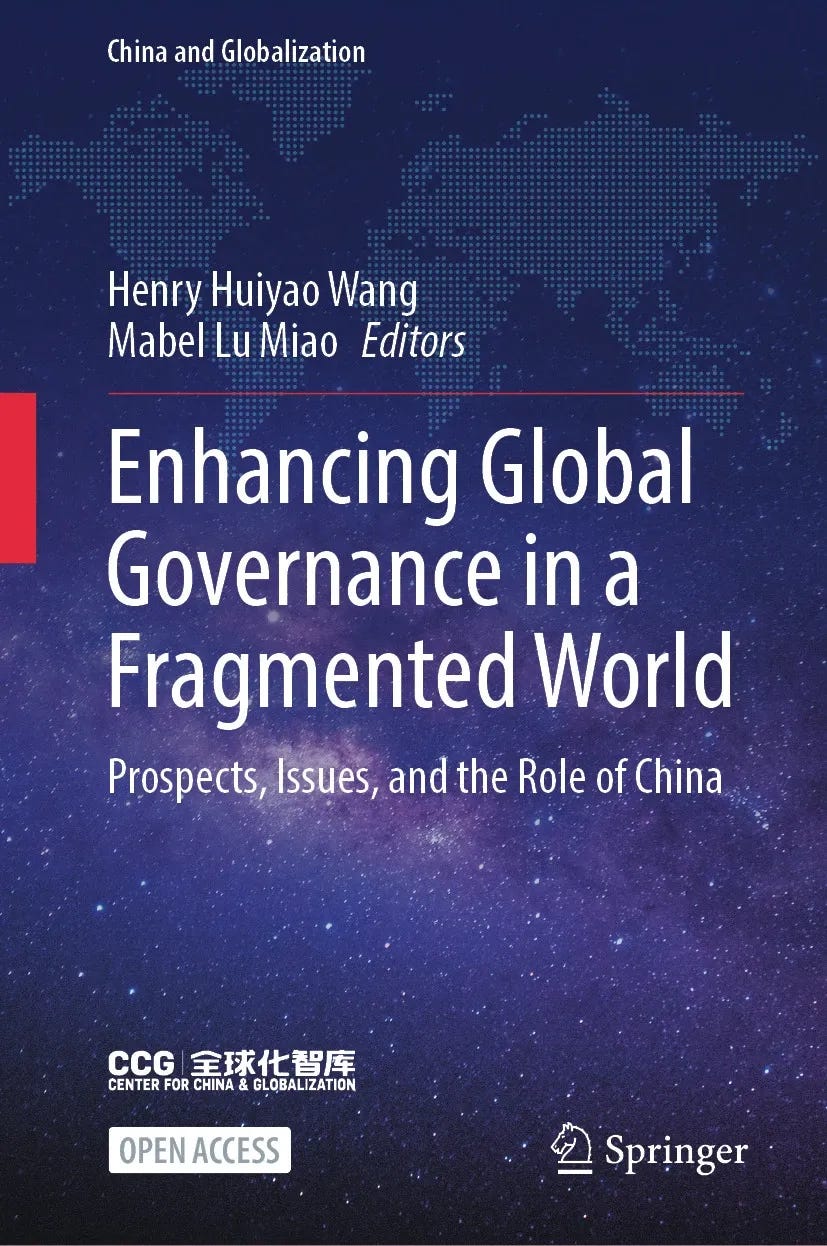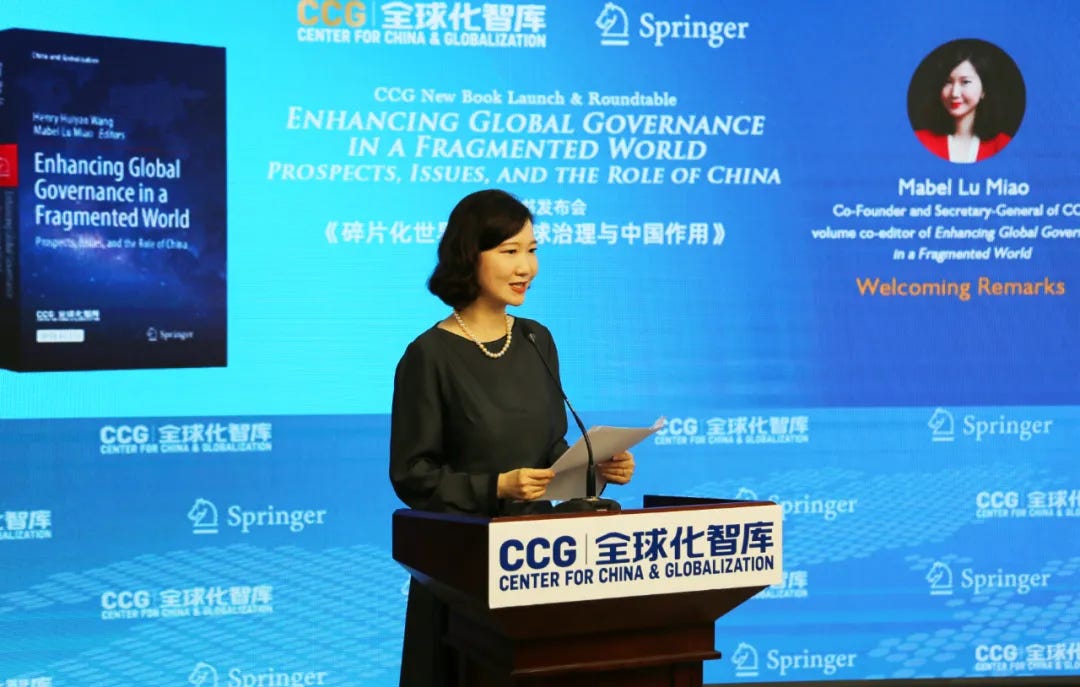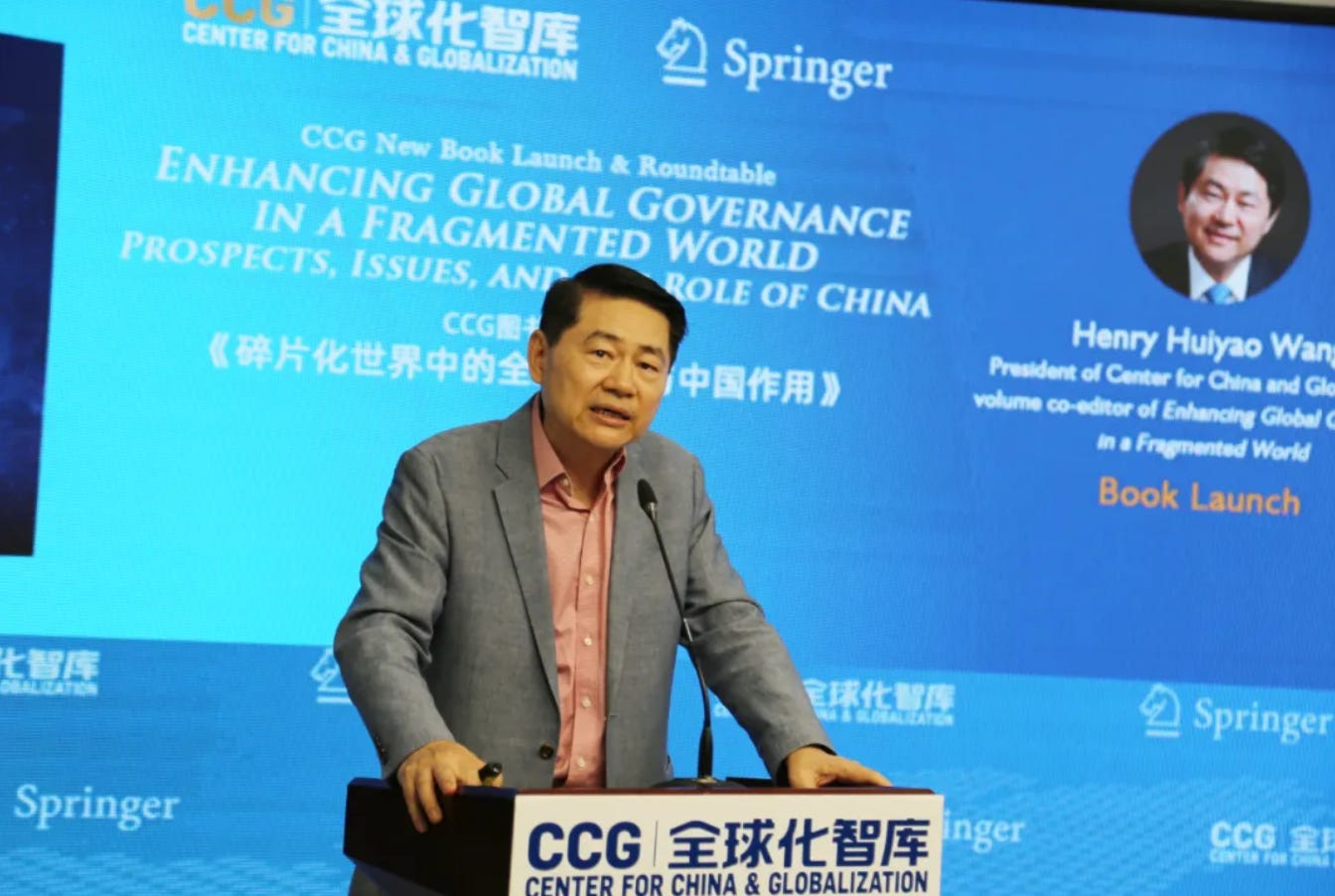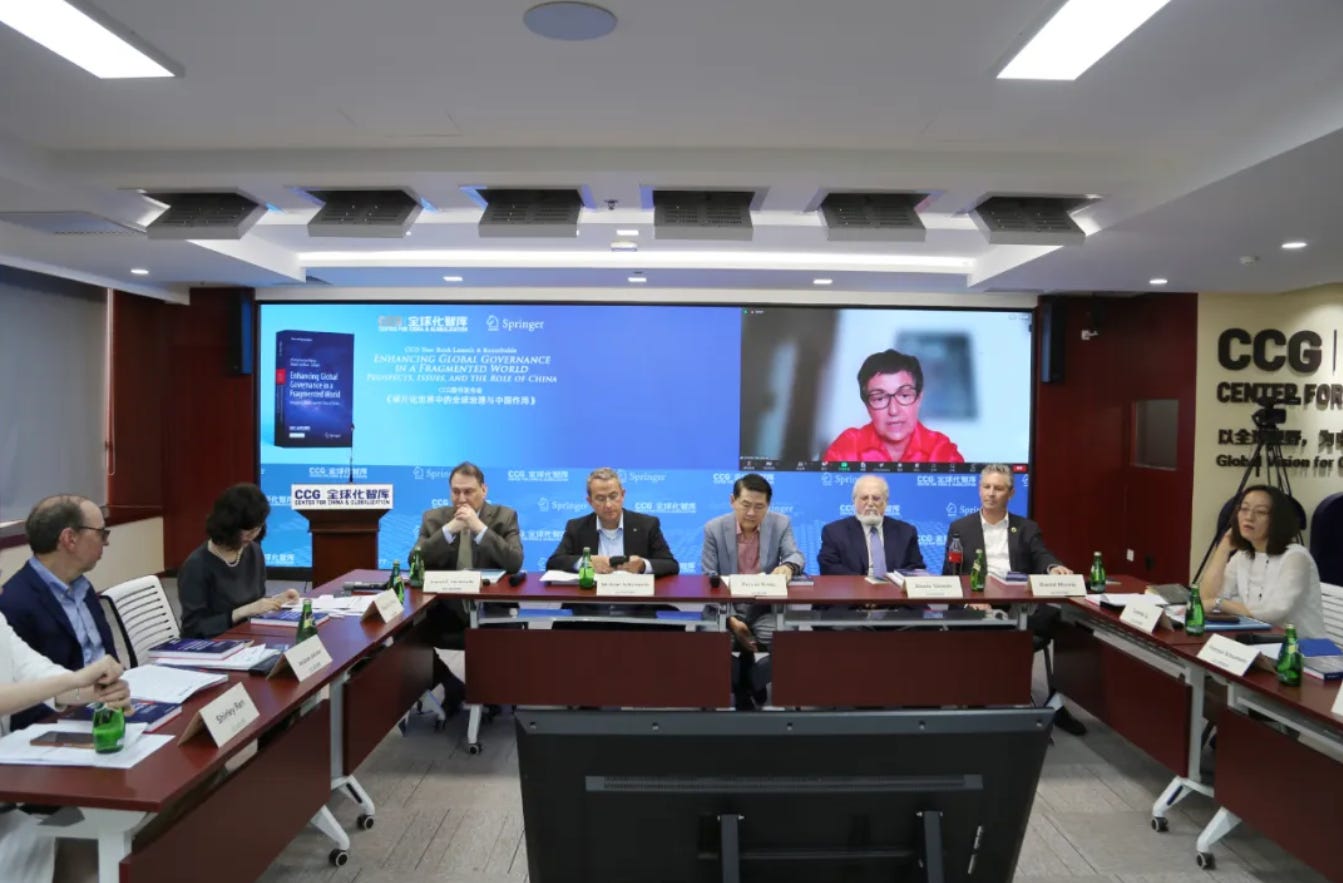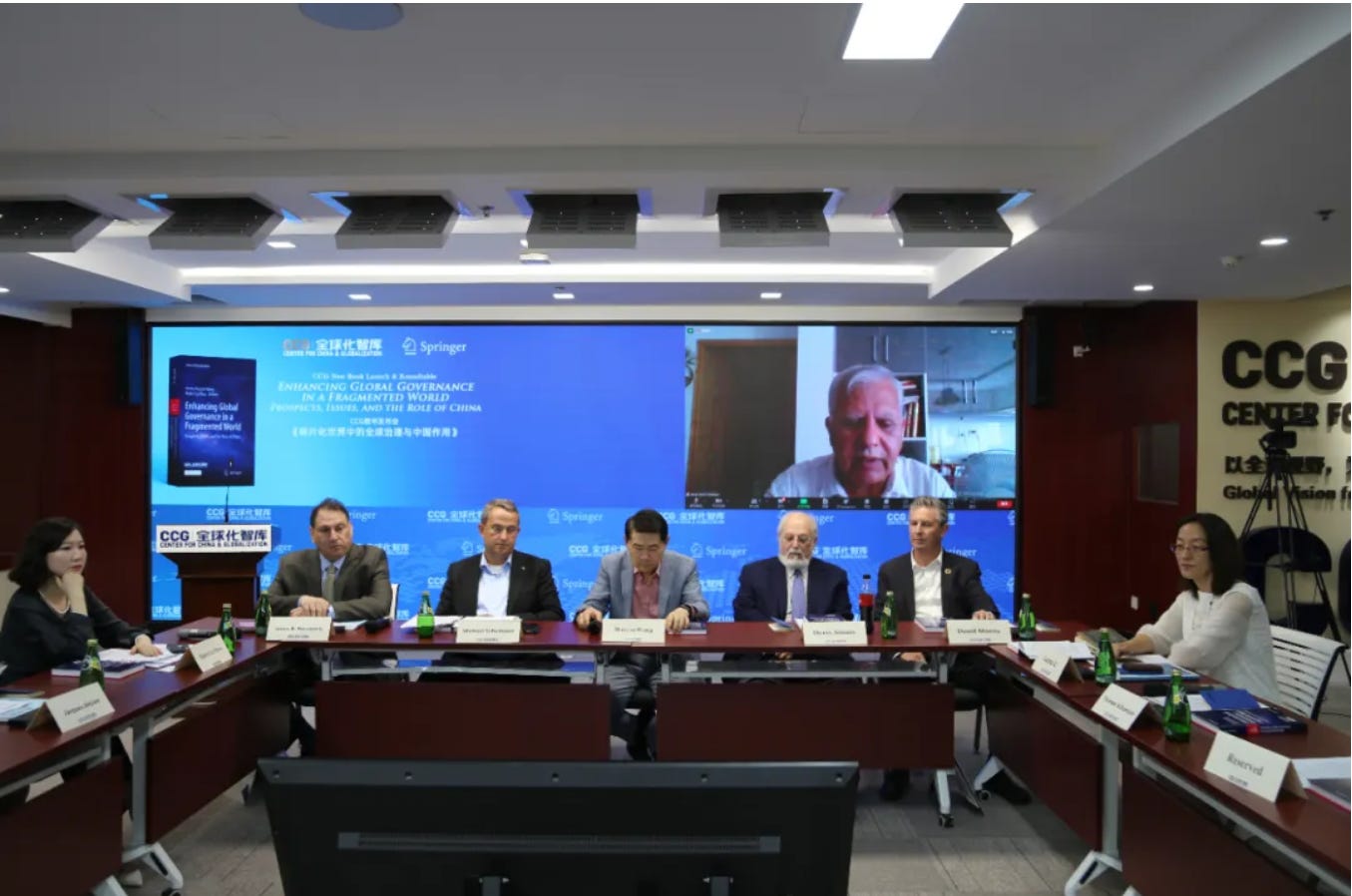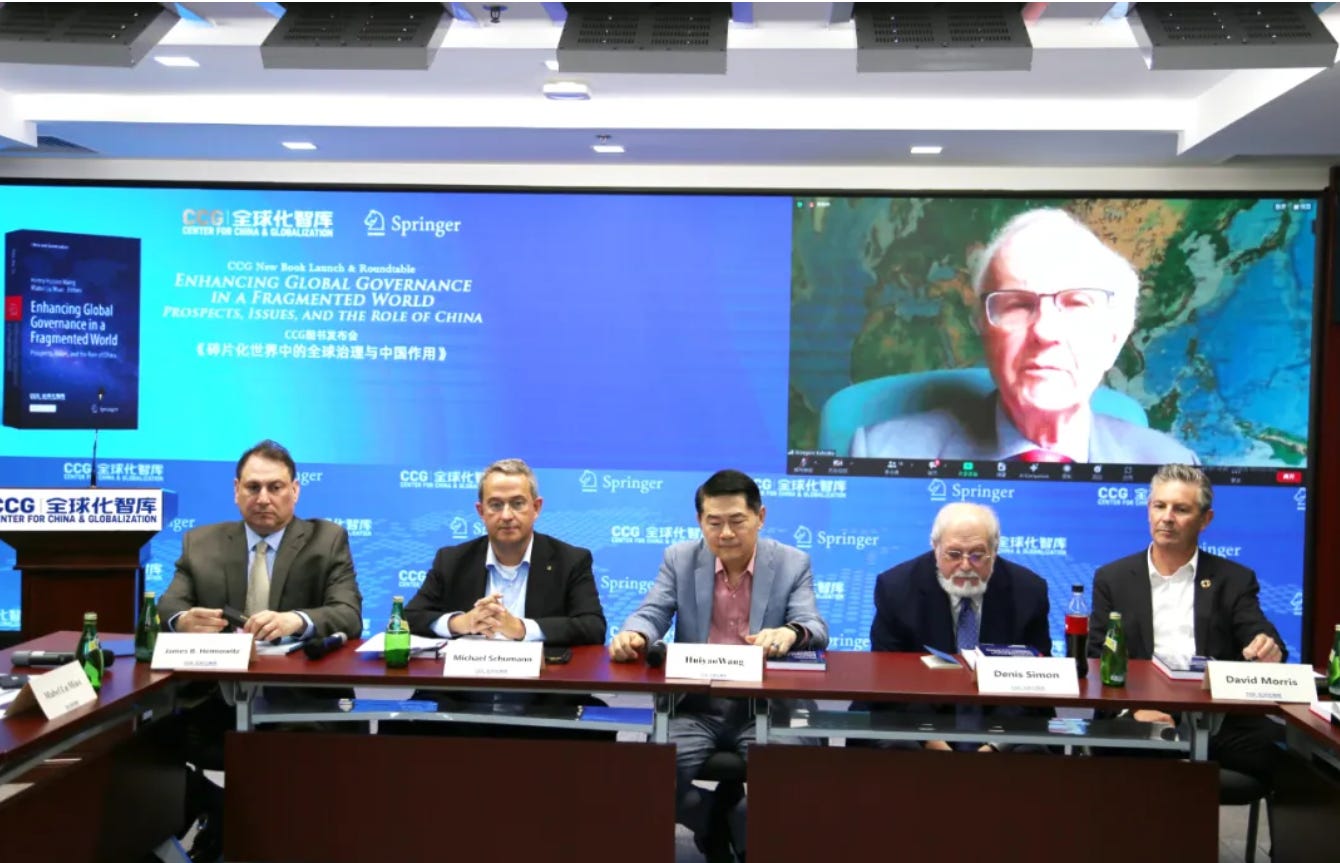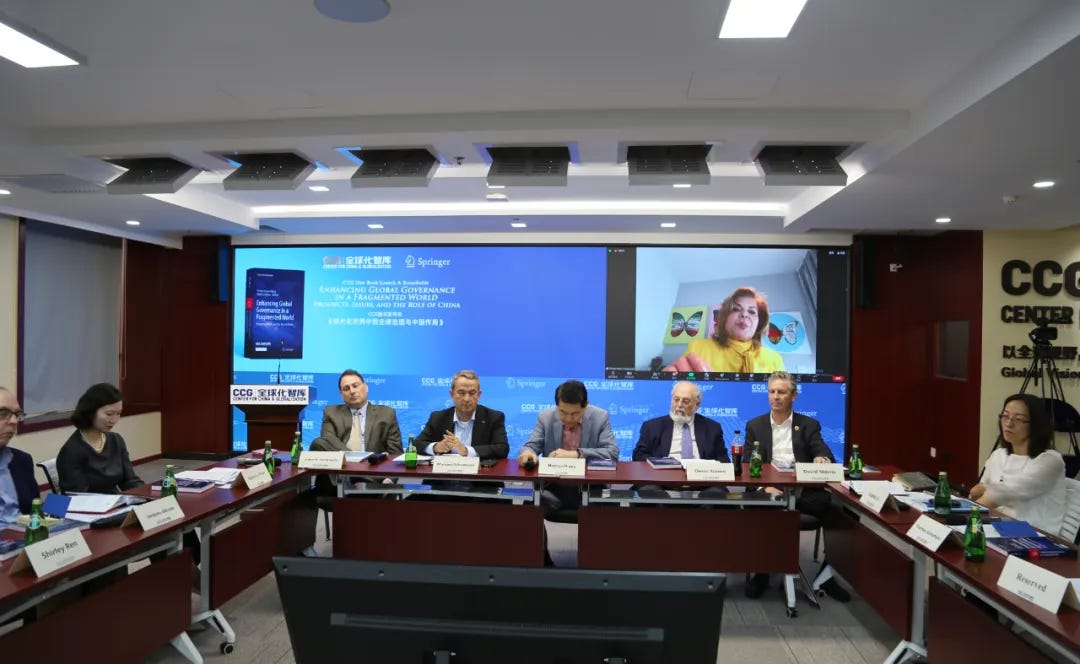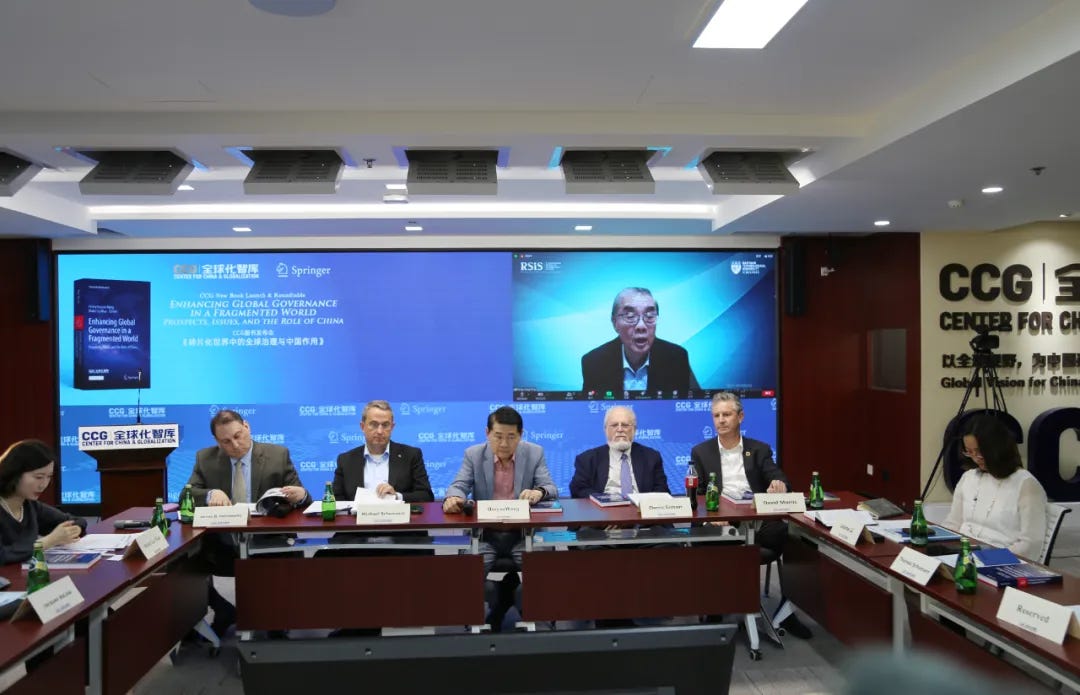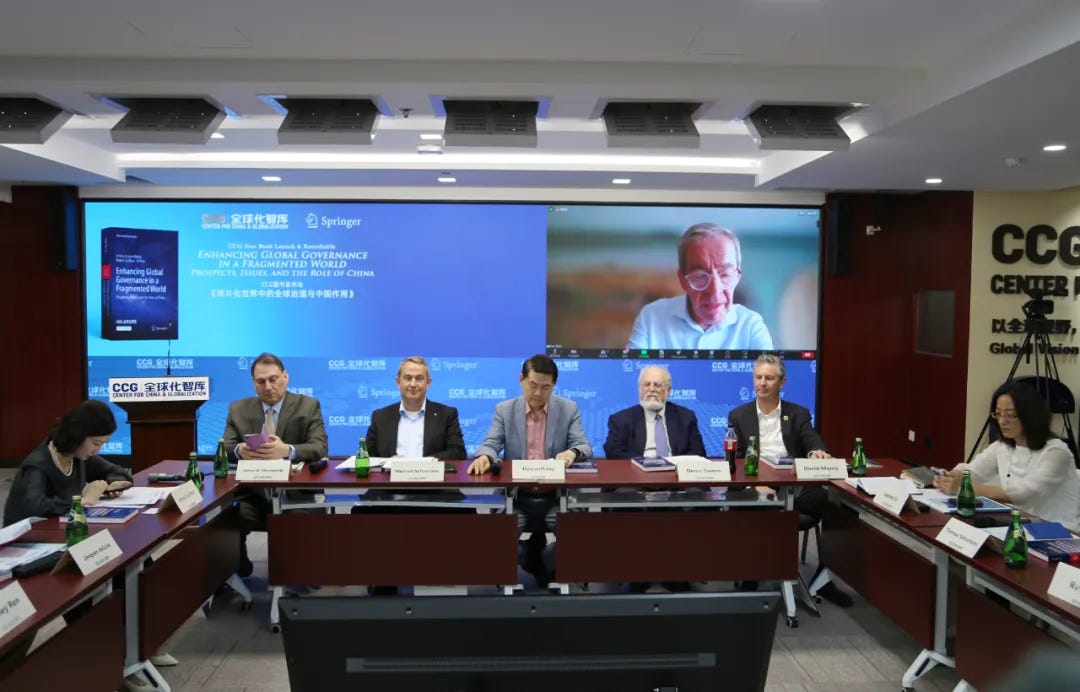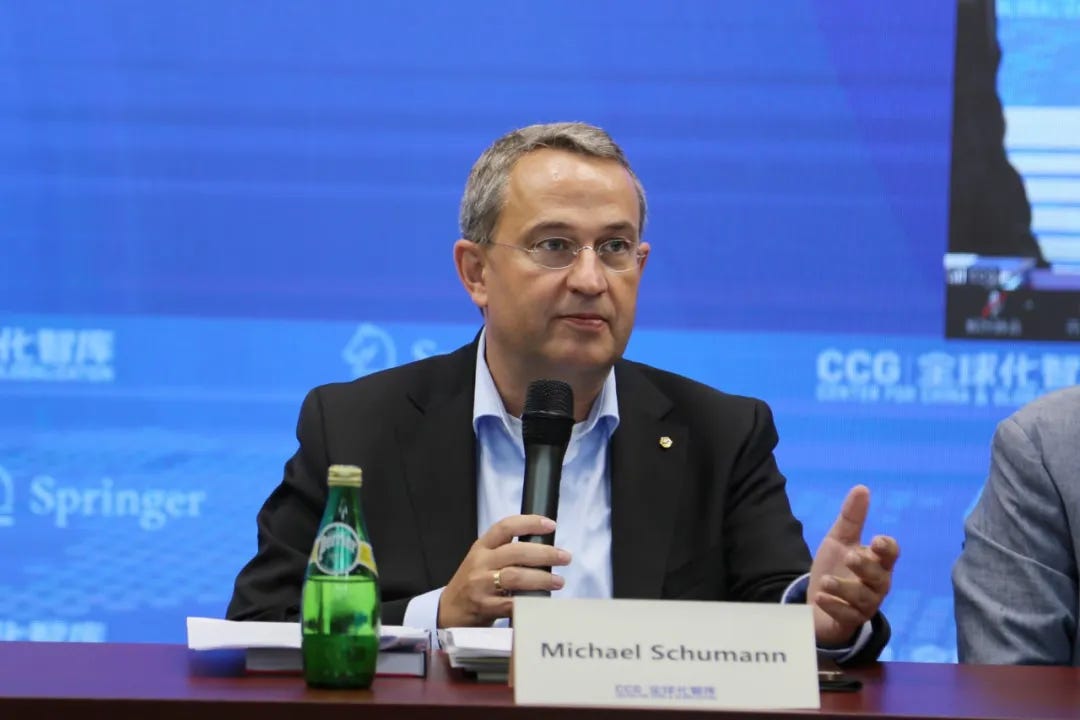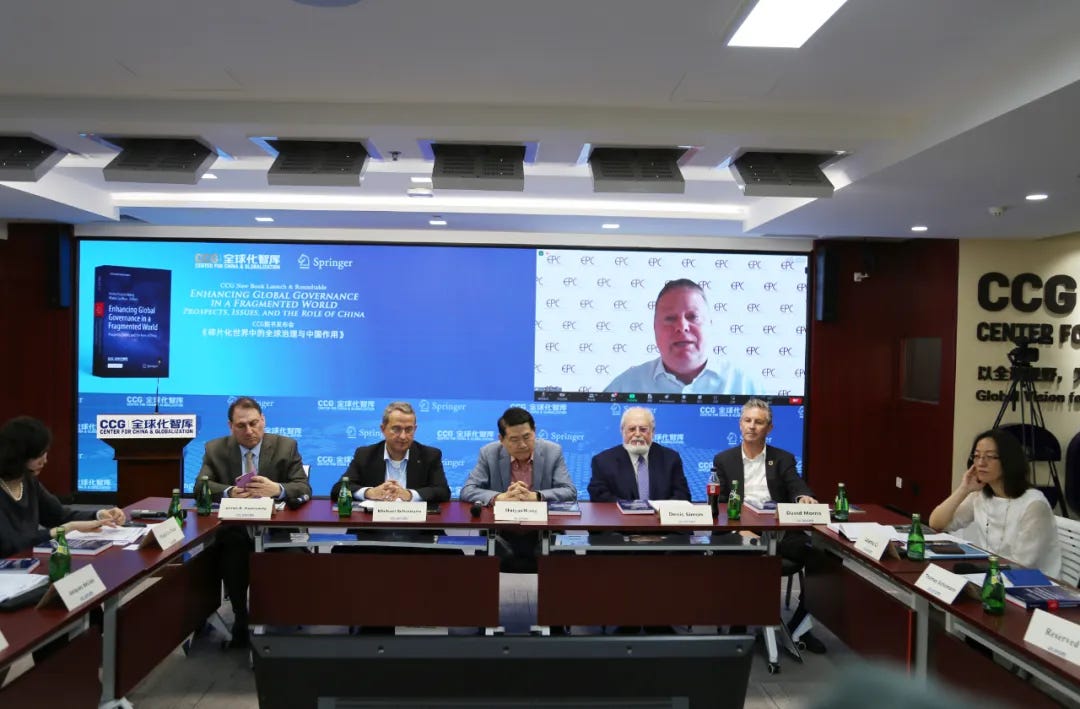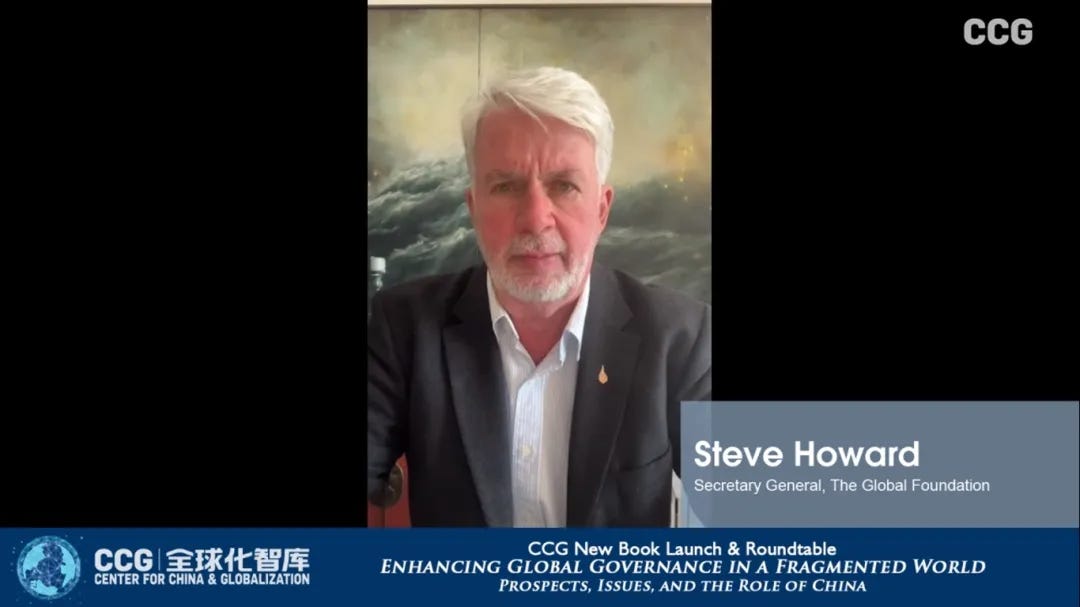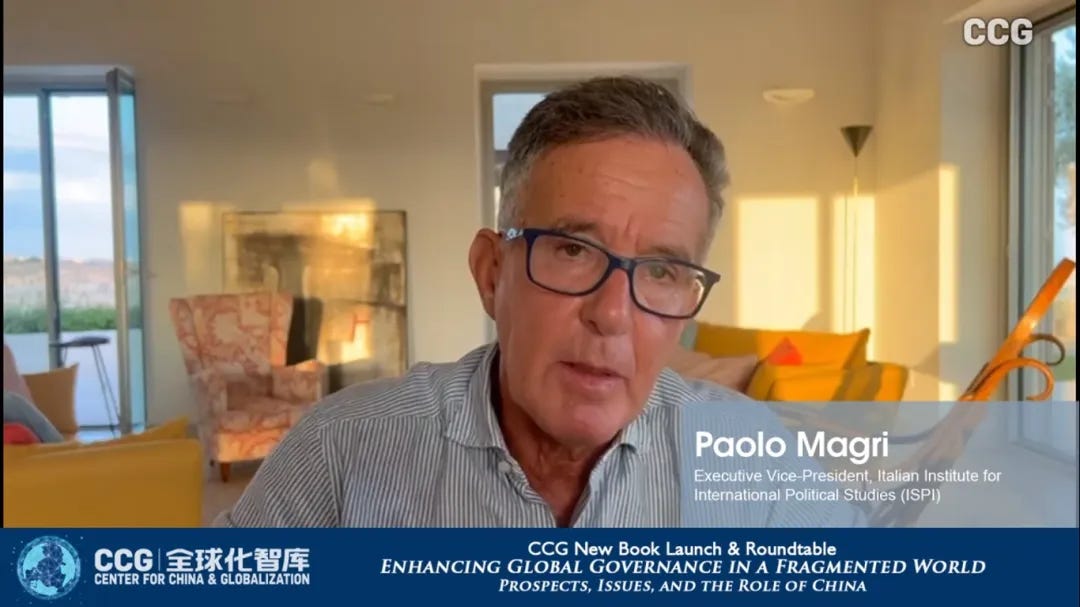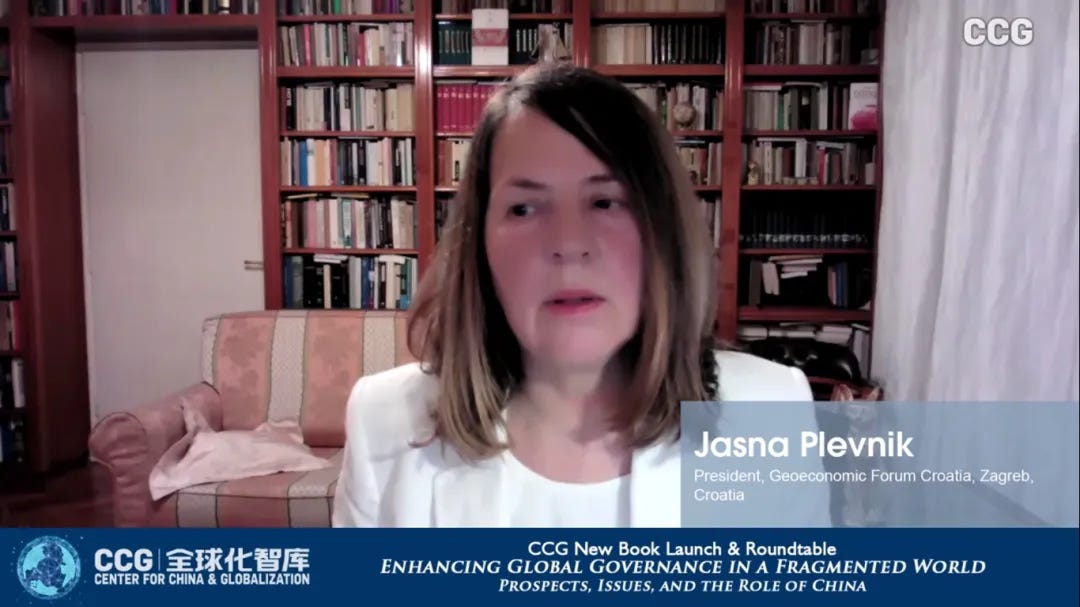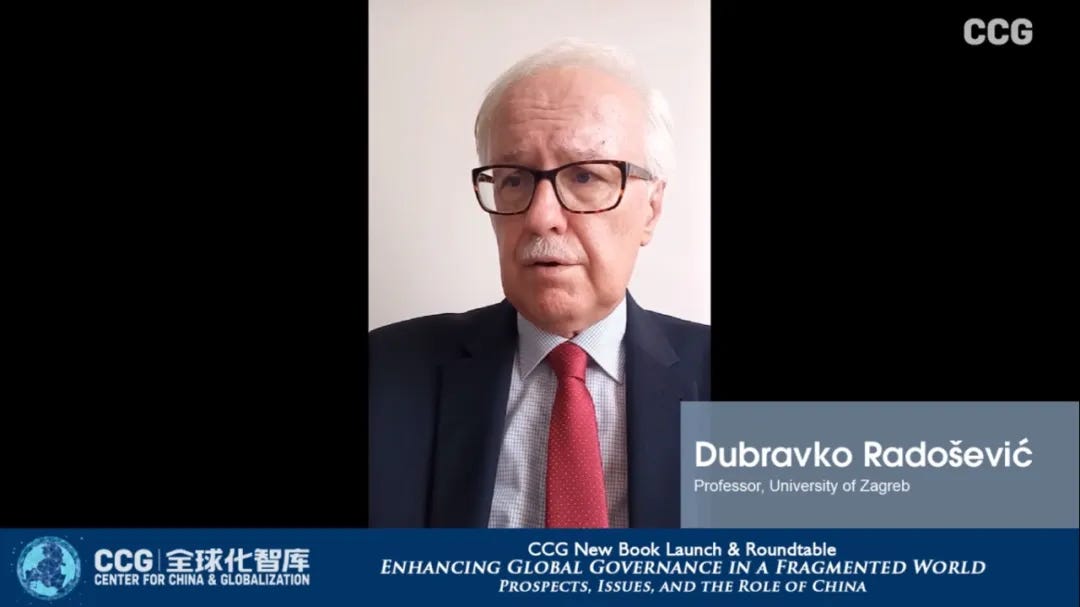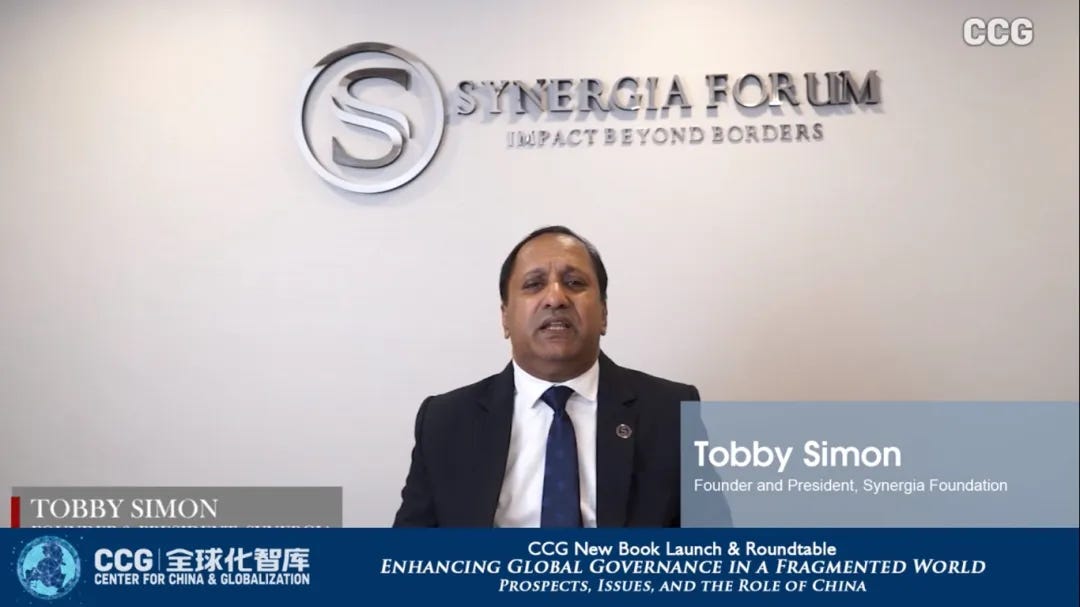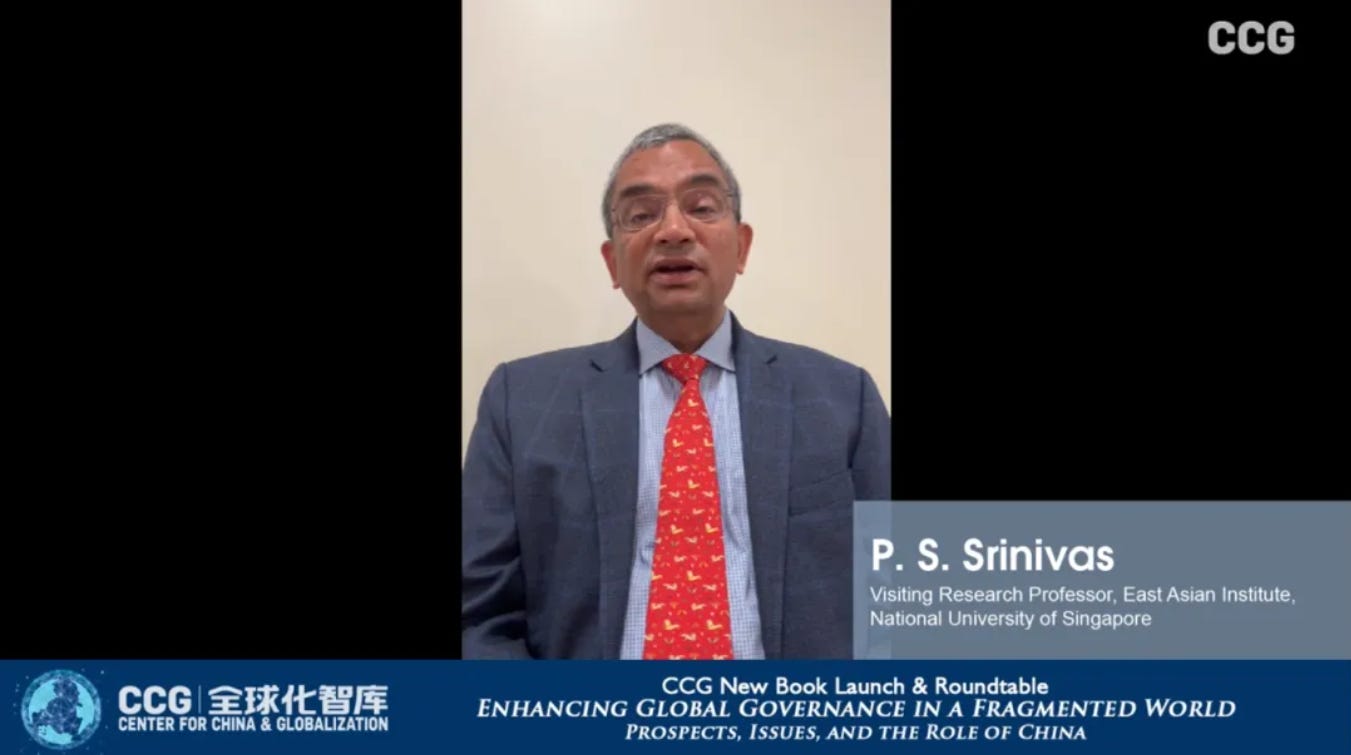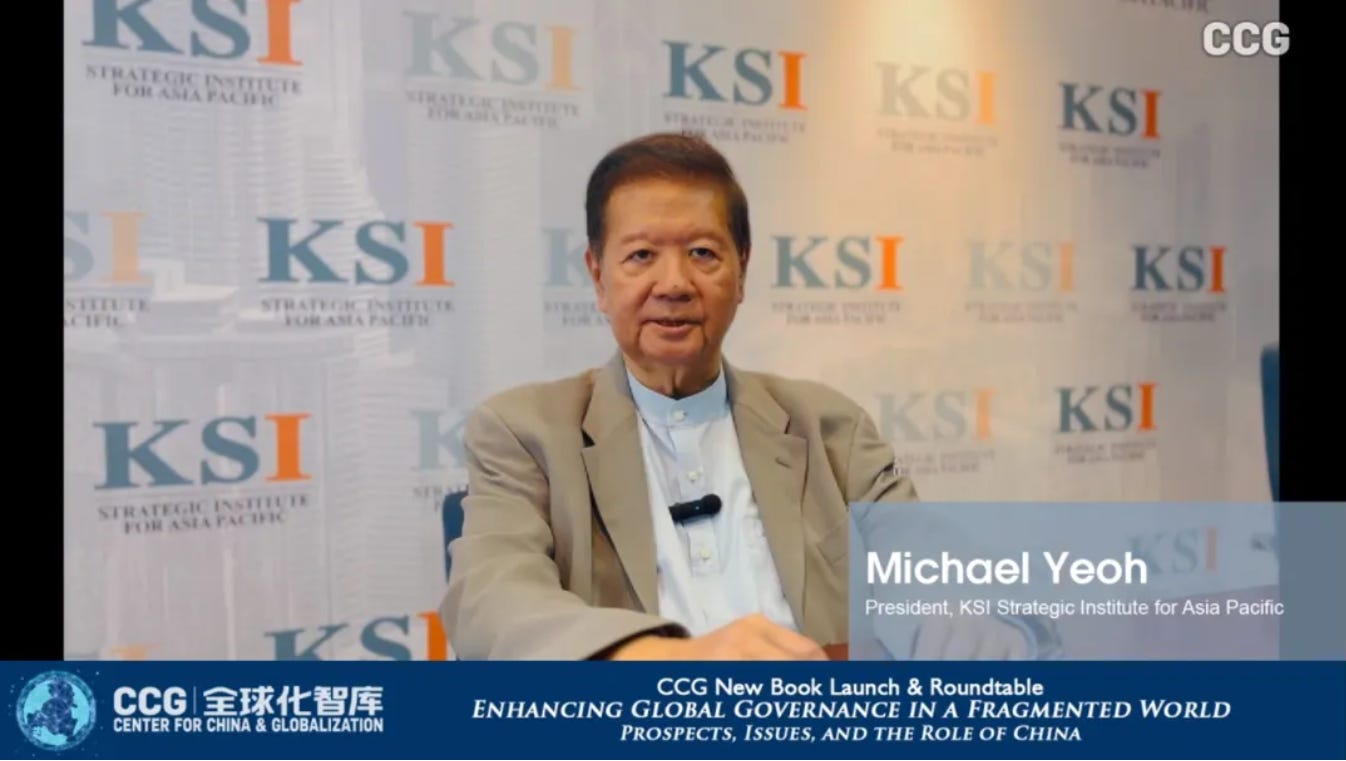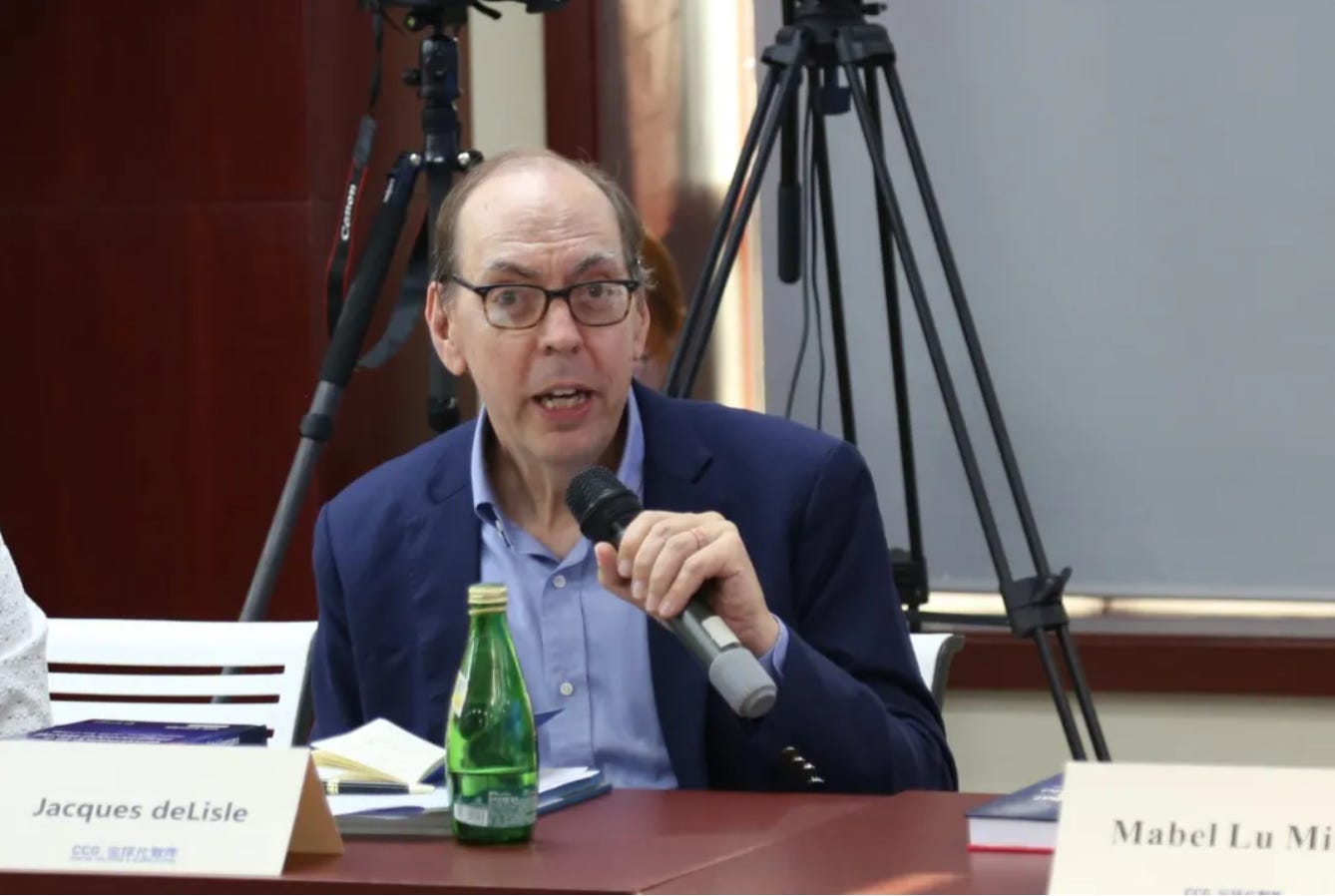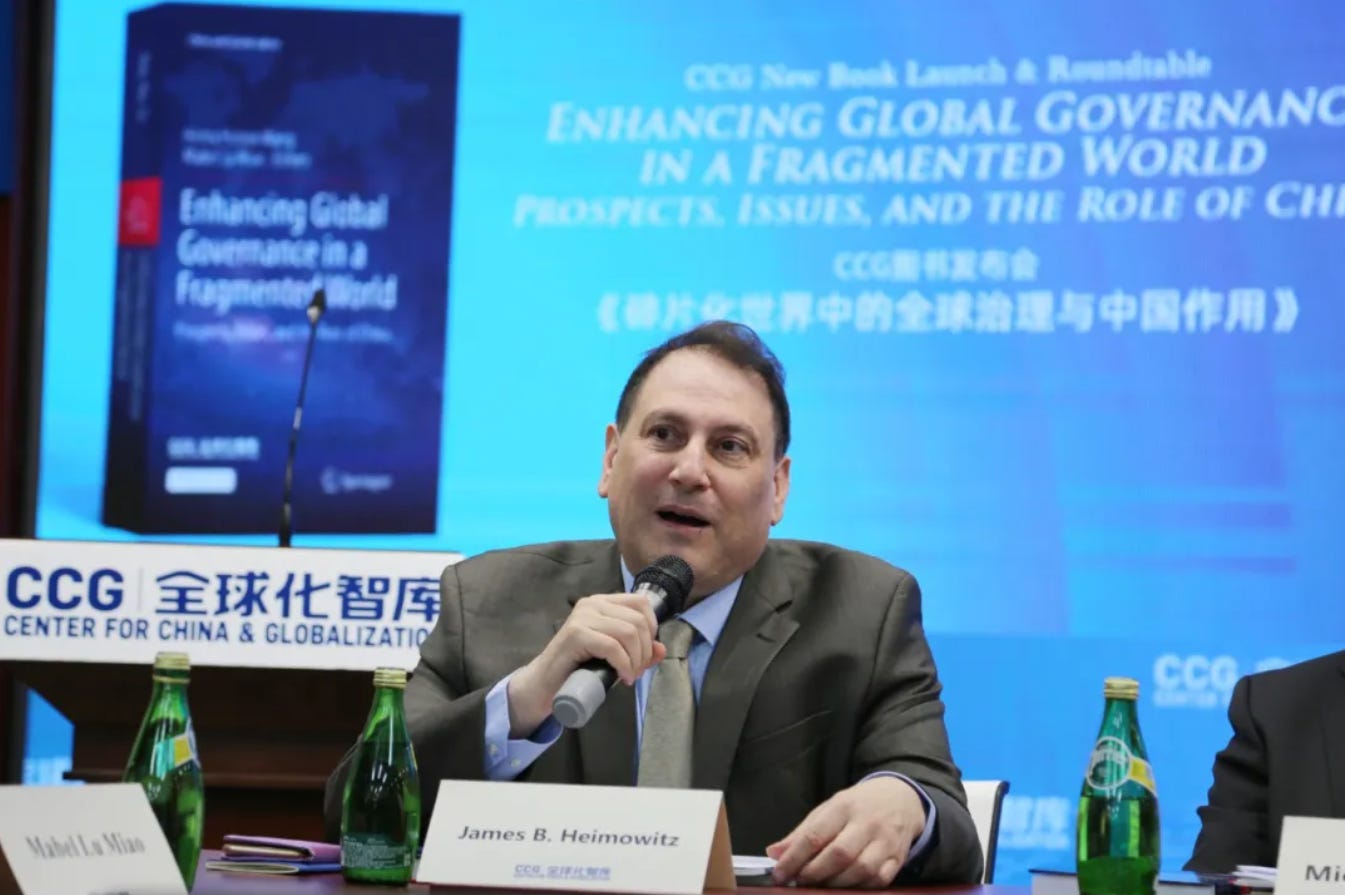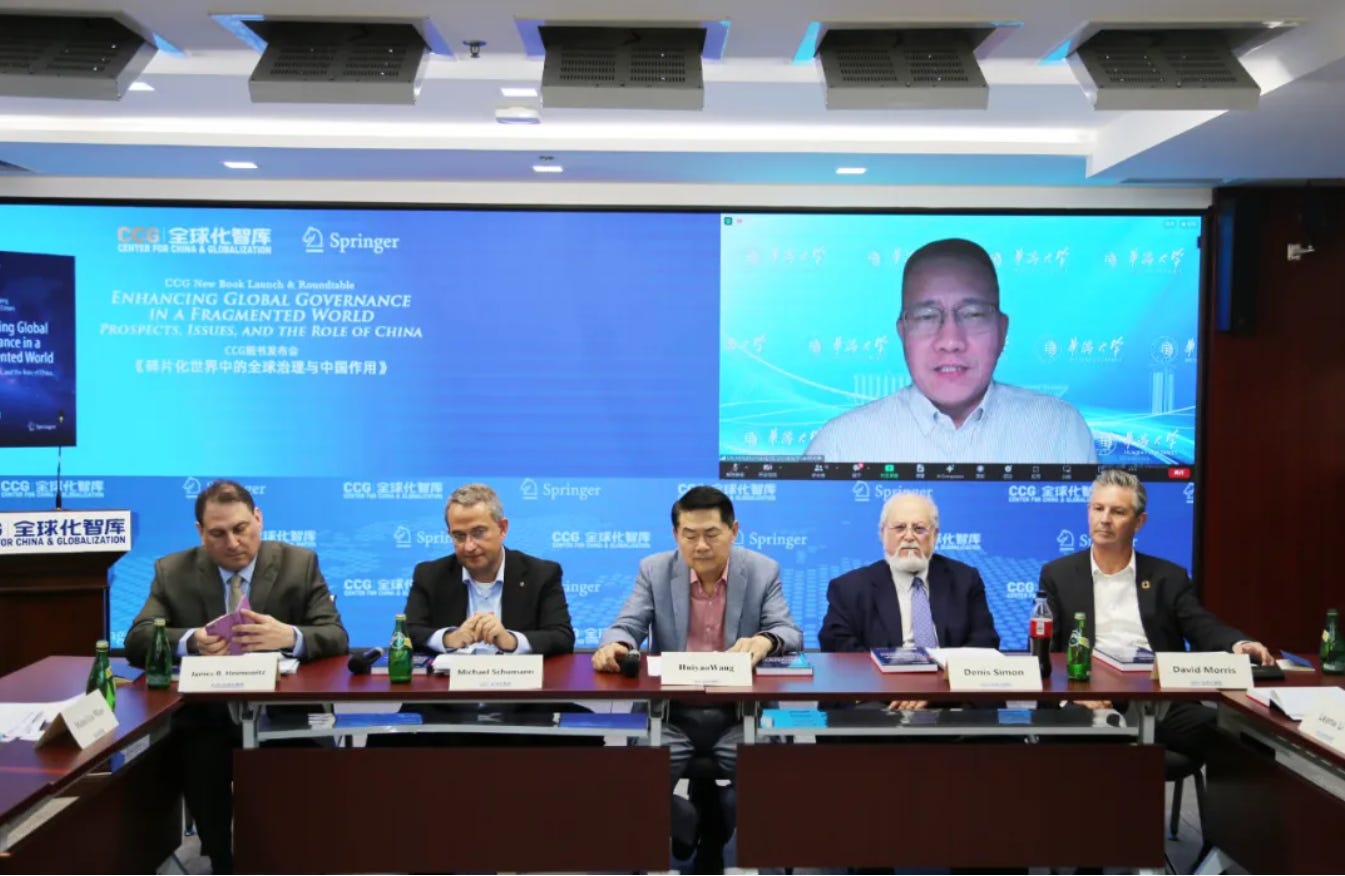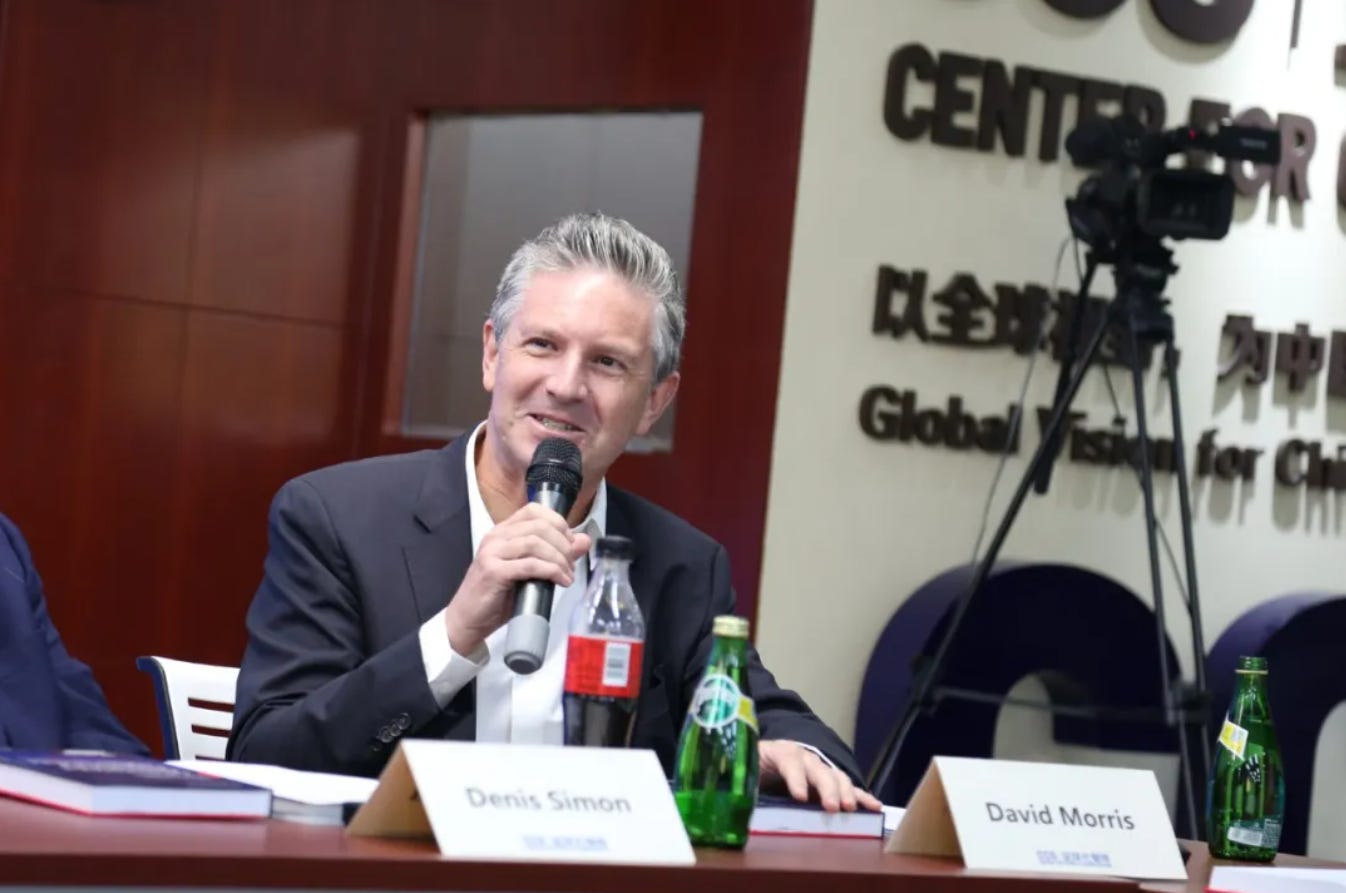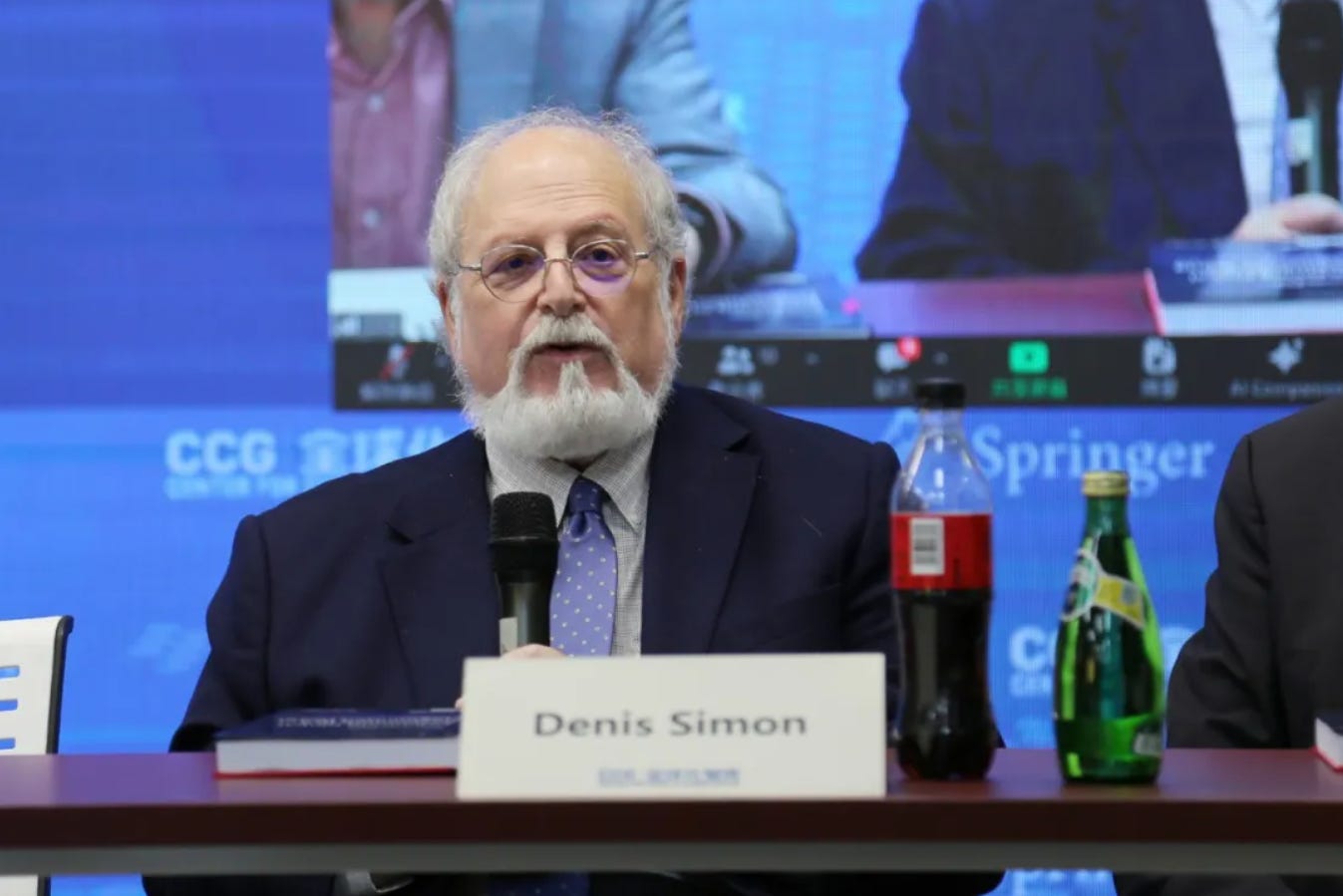Transcript of CCG book launch: Enhancing Global Governance in a Fragmented World
The book gathers 30 opinion leaders and offers a range of innovative ideas for a more universal, inclusive, and multilateral approach to reforming global governance.
On August 22, the Center for China & Globalization (CCG) celebrated the launch of its new book, Enhancing Global Governance in a Fragmented World—Prospects, Issues and the Role of China, with Springer Nature. CCG invited 30 leading figures from the global think tank community to contribute to the book, 8 of those attended the launch in person, and 7 more sent prerecorded speeches. Additionally, 5 discussants joined the event to explore a more universal, inclusive, and multilateral approach to reforming global governance. Emanuel Pastreich, Director of the Asia Institute also joined the book launch online.
The open-access book is available for free download on Springer's website.
The video of the book launch has been broadcast on major Chinese internet platforms and remains accessible online. It is also available on CCG's YouTube Channel.
Mabel Lu Miao, Secretary General of CCG, hosted the book launch.
The participants are, in speaking order:
Contributors
Arancha González Laya, Dean of the Paris School of International Affairs (PSIA) at Sciences Po
Zamir Ahmed Awan, Founding Chair of the Global Silk Route Research Alliance (GSRRA)
Grzegorz Kolodko, Director of TIGER—Transformation, Integration and Globalization Economic Research at Kozminski University, Warsaw, Poland
Mehri Madarshahi, former Senior Economist of the United Nations, Member of the Advisory Committee at ICCSD (UNESCO), and Honorary Professor at IPP/SCUT
Keng Yong Ong, Executive Deputy Chairman of the S. Rajaratnam School of International Studies (RSIS) at the Nanyang Technological University; former Secretary-General of ASEAN
Piet Steel, former Ambassador of Belgium to Vietnam; former Consul-General of Belgium to Hong Kong
Michael Schumann, Chairman of the Board of the Federal Association for Economic Development and Foreign Trade (BWA)
Fabian Zuleeg, Chief Executive of the European Policy Center (EPC)
Video speeches
Steve Howard, Secretary General of The Global Foundation
Paolo Magri, Executive Vice President of the Italian Institute for International Political Studies (ISPI)
Jasna Plevnik, President of Geoeconomic Forum Croatia, Zagreb, Croatia
Dubravko Radošević, Professor at the University of Zagreb
Tobby Simon, Founder and President of Synergia Foundation
P.S. Srinivas, Visiting Research Professor at the East Asian Institute, National University of Singapore
Micheal O.K. Yeoh, Founder & President of the KSI Strategic Institute for Asia Pacific
Discussants
Jacques deLisle, Stephen A. Cozen Professor of Law & Professor of Political Science and Director of the Center for the Study of Contemporary China at the University of Pennsylvania
James B. Heimowitz, Founder of JBH Consulting and former President of China Institute in New York
Lin Hongyu, Vice President of Huaqiao University
David Morris, President and Executive Director of 1EarthVillage
Denis Simon, Chairman of the Alliance of Global Talent Organizations; former Executive Vice Chancellor of Duke Kunshan University
Henry Huiyao Wang, Founder & President of Center for China and Globalization (CCG)
Good afternoon and good morning, depending on where you are. It's really a great honor for us to gather here at the CCG today to launch this new book: Enhancing Global Governance in a Fragmented World. This is really a very timely occasion to launch this book. Thank all of you, particularly our authors and our commentators to take part in today's event. I hope that this afternoon will shed some new light on the global governance, how we can meet the challenges, and how we can improve global governance. Of course, to enhance global governance, we'd like to hear the opinions and suggestions from our respected authors and, of course, our distinguished commentators that gather here. Also, we have representatives from the Beijing policy circle, think tank representatives, diplomats, and of course, also journalists of all kinds. It's a great occasion to welcome all of you here.
First of all, I'd like to really thank Springer Nature, Mr. Achauer, and Dr. Li for participating because Springer Nature is one of the largest publishers in the world and we have been collaborating with Springer Nature for a series of policy books—the China and Globalization series. This is already the eighth book that we're publishing. Just two months ago, we launched our last book, Escaping Thucydides' Trap, with Graham Allison of Harvard Kennedy School also at CCG.
This is really a very interesting book, I highly recommend for all audiences, not here today, but also online. We're going to put this on the China social media and of course on YouTube worldwide. Okay, let me give you some details about this book. This book really comes out of the 16 years of the Center for China and Globalization. We have been conducting a number of think tank events; we have encountered many very distinguished authors, policy people, ex-politicians and very senior thinkers of different parts of the world. We're really very pleased to see how we can put their ideas into a more compact book.
This book is part of the China and Globalization series where CCG wants to create a balanced global perspective by gathering the views of highly influential policy scholars, senior diplomats, multinational CEOs, practitioners, and opinion leaders from around the world and from China. This is what we're trying to do. We have published quite a few already, which can be downloaded. It's all open access like Consensus or Conflict, The Asian 21st Century and Transition and Opportunity: Strategies from Business Leaders on Making the Most of China’s Future, China and the World in a Changing Context: Perspectives from Ambassadors to China, The Ebb and Flow of Globalization: Chinese Perspectives on China’s Development and Role in the World, The Future of China’s Development and Globalization, and Soft Power and Great-Power Competition: Shifting Sands in the Balance of Power Between the United States and China. This is really a very interesting book series that we're doing right now.
The world is in a polycrisis now because we're having the Russian war on Ukraine, we have the Gaza conflict, we have climate change, we have big power competition—those are challenging questions of our time. With all those in mind, we are trying to seek the ideas of respected authors and thinkers on how we can do better from global think tanks' and all the countries' perspectives and how we can really work on global governance, on multilateralism, and also China's global role in terms of all those new challenges. How we can work together is really important.
From that perspective, we have conducted many think tank forums in China. For example, since 2016, for the last nine years, we have already had eight think tanks forums. Hundreds or even close to thousands of participants attended our think tank forums. And we're having another one on December 4 this year, our 9th Annual China Global Think Tank Innovation Forum. So welcome all of you to come again to attend our forum.
Enhancing Global Governance in a Fragmented World is a book coming out of many years of a think tank discussion, but it primarily focuses on the recent geopolitical and economic developments and all the challenges that are facing the world today. We have invited 30 Contributors. As Dr. Li said, they are even spread into five continents of the world. We have representatives from Asia, from Europe, from America, from Africa, from India, so it's really a well-rounded representation of different regions and countries.
Again, it's an open access book, which means those chapters can be downloaded. Universities, think tanks and the public can really read this book for free thanks to the Springer Nature's open access book channels. For example, one of the books that we edited in our series has been downloaded 3.7 million times already. With all the books added up, there have been probably 6-7 million downloads. The impact it has is incredible.
It is really interesting to see how we can explore the theme of multilateralism, globalization, and solutions to solve our crises and problems. This is really a great effort. We have altogether 25 essays in this book, which is a multilateral approach to the reforms and opening of the global governance discussion. We hope that we can gather all the views today as we will invite authors to briefly mention their theme again. These are very interesting times.
Fascinating articles of thinkers, think tankers and, opinion leaders, great ideas and recommendations. This is a really interesting effort. I think it's probably the first time a Chinese think tank like CCG has actually gathered the global opinion leaders. About a third of them I put into the book. The last time we did that was in 2021, Consensus and Conflict, which is another book about 38 global opinion leaders. This time is the second time we have done that, but time has also changed. In 2021, we were saying Consensus or Conflict. Unfortunately, conflict happened. This is the book where we are trying to address the fragmented world and we need wisdom from all the scholars, all the authors, and of course, all the people here.
I think that we are really in an urgent time. The United Nations is facing a lot of challenges. WTO is facing challenges. All the international organizations are also facing challenges. Multilateralism, the system that has been the carrier for the last 78 years since the Bretton Wood system is facing challenges. How we can really maintain, upgrade, enhance is really important. So let's embrace multilateralism, force the global cooperation and build inclusive global governance. That would be my brief introduction, and thank you all very much.
Contributors
Arancha González Laya, Dean of the Paris School of International Affairs (PSIA) at Sciences Po
Thank you very much for this invitation, and thank you also for putting together the very timely event. It's true that from the moment we contributed to this publication and today, the weather has turned for the worse. There is more risk, fragmentation, polarization, strategic rivalry, so I think it's very timely that we look at this. And I thank you for the invitation.
I will not dwell on the whys because I think the many contributions that you have quoted go very much in-depth on the reasons why we find ourselves here and on the need for greater international cooperation and how to do it. But I want to focus on what I see as three big flashpoints that we need to urgently work on, whether it is at the national level because at the end of the day, governance today is mostly still made by sovereign states. So whether it's about sovereign states working to resolve their own issues that have an impact on others, or whether it's sovereign states together with other non-state actors coming together to address challenges, I want to focus on three flashpoints.
The first one has to do with the economy and international trade. Since you have asked us what role China can play, I think China can play a very important role by advancing what I see as a growing imbalance between the external sector and domestic consumption, which is having a spillover effect on the world economy, on economies of the rest of the members of the international community, and which I think has a lot to do with what the investments that China will make to strengthen the social safety nets at home, whether it's on immigration, healthcare, or pensions that will unlock a lot of the domestic consumption that today is very subdued.
So the first flashpoint that I would like to put on the table is the importance of working to rebalance as it has always wished to do between the external sector and domestic consumption.
The second flashpoint that we need to urgently get to work is got to do with peace and security, and it's got to do with the conflict between Russia and Ukraine. There are many conflicts in the world. This is not the only one. There is pain and suffering in many parts of the world, but this is, in a way, emblematic of a failure in the international community to resolve a conflict and to resort to war and the redrawing of international border, something that in a way the international system post-Second World War was meant to avoid.
So I think the second flashpoint and the second urgent task ahead of us is to put an end to the conflict between Russia and Ukraine because, in a way, it's emblematic of the failure of global governance to maintain peace and security. Again, it's not the only conflict in the world. There are many more, and I can think of a long list. We see them every morning when we get up, but I think this is emblematic of a failure.
The third one has got to do with climate change. It's true that the major emitters are today on a path to decarbonization, something that needs to be welcomed. Whether it's China, the US, India, or the European Union, the path is to decarbonization. These are the big emitters today. But I think we are not considering the impact of climate change on many other countries around the world who today lack the resources to face and to prepare. They're not big emitters, but they're on the short end of the stick. They eat, they suffer the impact of climate change, and they are unable to weave the fight against climate change with their own development objectives partly because of a failed international financial architecture.
These three, to me, are emblematic of where we should focus. If we wanted to stabilize a little bit a world that, let's say, is innovative for turbulence. So, Henry, I hope I have put a bit of fuel into this excellent conversation. Thanks again, and very much looking forward to continuing the conversation.
Zamir Ahmed Awan, Founding Chair of the Global Silk Route Research Alliance (GSRRA)
Thank you. Good afternoon. It will be 2 P.M. in Pakistan, so I say good afternoon. Please accept my greeting according to your time zone. Maybe it is good morning for someone and maybe good night for someone. Accept my apologies for that.
I also have served in the Pakistan Embassy as a diplomat, as a counselor for science and technology. At that time, from 2010 to 2016, I had a good interaction with the China's higher officials. So I have a very good grip of Chinese society and the system. I have seen and witnessed the early stage of reform in the 1980s, and I have seen the mature, developed China in recent years. I travel to China frequently, so I'm always updated with China knowledge.
In addition to my book chapter, which you can read anytime, I would like to say that the best thing about the Chinese system is that they get the feedback of each and every policy from the public, from the stakeholders, and they keep on improving and changing it. This is the best governance in the world. They make a policy and then implement it. During the course of implementation, they get the feedback of the stakeholders. And then if there is something wrong or if there's space for improvement, they keep on improving. This is something amazing, which I don't find in my country here.
In my country, the people say this is allowed, and this is not allowed and they have to implement it. In China, they're quite flexible in some areas. Based on feedback, they are improving. This is one of the reasons why China has made so huge development and so good progress in just four decades.
And one thing more, the Chinese people-centric approach is very impressive. I have seen, I have witnessed, I have experienced that the people are the beneficiaries of the Chinese policies. And if by chance there is something wrong or something inappropriate, they immediately rectify it. They don't exercise their power to implement the wrong policies. They are very flexible in this way.
One thing good about Chinese society is that they are always willing to learn not only from the stakeholders, the inside, and the Chinese public, but they also want to learn everything from abroad, from the developed countries and also from the underdeveloped countries. Even sometimes they learn from the Middle Eastern and African countries. They are open-minded in contrast to some people in my country. They think they are perfect, they know everything. But the Chinese don't argue for that one. The Chinese people, they believe, let's learn something more. They do whatever that suits their society. They do whatever they think is right and appropriate. But they give the chance to the other party to express their feelings and share their feelings.
I think there are a few things that are inbuilt into the Chinese genes that they are very successful in making so good progress just in the four decades, which has never happened in the history of humankind. I think that the rest of the things you can see in my book, and I see Henry Wang wants to remind my time limit. So I think that with this, I wish everybody good health and a good trip and success in life and be happy. Thank you, everybody. Bye bye.
Grzegorz Kolodko, Director of TIGER—Transformation, Integration and Globalization Economic Research at Kozminski University, Warsaw, Poland
Greetings from Warsaw. I'm speaking from Warsaw, Poland, a very central European country which is involved in world affairs in proportion to our economy and political meaning, but basically on a political economist with a lot of experience from making policies and politics being four times, first Deputy Prime Minister for Economy and then Finance Minister. I was in charge of the Polish transition as a key architect of Poland's integration with the European Union and opening up relations with other countries. We try to make our contribution to the global affairs as much as we can, contributing less than 1% of the global GDP and having just about half of a percentage point of the global population. But still, I think my country is important from another perspective.
Quite recently, and I am quoting this opinion in my contribution to the volume which has just launched today, a very influential weekly British American economist stated that as far as the future of the world is concerned, there is gonna be a kind of conflict of clash, actually, hostile competition between the West led by the United States, and the East with the leading position of, as they say, China and Russia. Of course, China's position relatively is growing and Russia's position is sinking, especially since the shameful invasion of Ukraine two and a half years ago. And then this economist's opinion says that these two parts of the world will compete to make a bigger influence on the Global South, using some time to the military leverage.
My position is quite different. I'm saying the worlds on the globe are not as divided into hostile parts, West and East, but rather as coexistence of two megaspheres, Euro-Atlantic and Euro-Russian. Of course, Euro-Atlantic part is led by the United States, which is much more recently involved in the election circus in place over there than in thinking and acting on the behalf of improvement of global governance. And then there is the Euro-Russian part of the world. The European Union is part of both, of Euro-Atlantic and Euro-Russian at the same time. The day we were discussing the book launch, China's Prime Minister is visiting Moscow; he was in Russia. And Poland had the first, in 45 years, official visit of India's Prime Minister. Mr. Modi was in Warsaw. And we discussed the issues of how to develop, first of all, bilateral economic relations.
But everything makes an impact, casting a long shadow on the global affairs. From this perspective, I'm seeing the European Union to which I brought Poland 20 years ago, coordinating that time the economic policy and institutional reforms, as being a part of both—Euro-Atlantic and Euro-Russian. I believe that the smart policy of the new European Union leadership—we are just off the election, as you know, in the European Parliament and we in the process of establishing a new European Commission—is to develop working, pragmatic, fruitful, and pro-development relations with the United States, China, and other countries. I think one significant country I'm observing the great interest and great attention to is the relations between China and India. These relations will have a significant influence on governance and moving forward towards more inclusive globalization, which is called in China "win-win globalization." Sometimes we're joking that win-win does not mean that; that it's supposed to mean 2:0 for China.
There is no need for any military leverage, yet unfortunately, we're going into not only Cold War but, as we know, in some places also hot war. The world spends only 2.5% of the global output, that is, more than two and a half trillion dollars this year for so-called defense. Everybody is talking about defense. Nobody is talking about attacking somebody else. Everybody is defending himself. Unfortunately, I'm saying unfortunately, which is very popular in my country, Poland now is country No.1 as far as the share of military spending in GDP is concerned. We are spending 4.2% relative to GDP, even more than the United States. So what do we observe in current parts of the world? This is a kind of militarization of the economy at a time when there are not enough resources to be allocated for fighting public enemy number one, that is, warming the climate, fighting poverty, and so on. And these problems are not possible to be solved without the re-institutionalization of globalization.
Again, I'm an economist. I mean by economic globalization, the historical and spontaneous process of liberalization and integration thus far to the extent of forming separately national economies into one worldwide intertwined global economy. What happens here depends on what has happened somewhere else and is making an influence in other parts of the world. We are connected. From this perspective, there is a need for re-institutionalization of globalization. And each initiative going in this direction is very important. I do expect that the Chinese leaders, for instance, will support in the proposition of the Secretary-General of the United Nations to bring the African Union to the permanent member of the Security Council of the United Nations. There is so much to be done.
And of course, as it is stated several times in our book, very much depends on leadership. If there is proper leadership and some realistic, pragmatic long-term vision, not an illusion, this is the starting point. So the question is what kind of leadership we may expect in certain countries. But if you go from country to country, we see how big problems we have in the U.S., the UK, France, Germany, and Poland, and elsewhere within the democratic regimes or authoritarian political systems. The lack of leadership is a very big problem. So maybe that would be a good idea to have another volume, co-edited and published by Springer and CCG about the necessity to restructure leadership in global affairs because without such, it is impossible to address the issues.
To conclude, as an economist, I'm selling also in my books that globalization, according to my economic definition, is an irreversible process. There are the frictions, there are the problems, we have the trade war. Actually, we have the Cold War II going on, sometimes imposed by or called by the United States especially against China. There will be a great competition to make an impact upon the so-called Global South. And this competition is definitely being won by China. China's position in the Global South is growing, while the position of the United States and the former colonial powers, especially the UK and France, is weakening. The Global South in terms of economic output is growing faster than the rich North. The population of Global South, not anymore in China, but in the Global South as such, is growing, while in the West it is declining. So the relations between population, economic, and political might are changing. It is hardly to be accepted by the United States, which we may observe during this presidential campaign going over there, but it is an irreversible process.
Now the big question is how to govern the global affairs to make it more peaceful, more cooperative, and less hostile. This is the big challenge. And there is a solution to the challenge, but I'm not sure that we are going in the right direction. I'm very much concerned as far as the future of the work economy is concerned because of the Second Cold War. So the question is how [inaudible] these military and political tensions. And I put a lot of trust not only in the political leaders, at least in some of them, but also in the business circle. Business people are not by and large on the side of raising the protectionism and trade barriers because it is bad for expansion and bad for development. So maybe we have to go a little bit more, again, from politics to economics, to discuss the challenges for the future and how to make the world less fragmented.
Again, since I'm talking with you, listening to you, learning from you, being in Warsaw, we are a small country in Central Europe, but I think that my country can play a relatively bigger part, being a member of the European Union, being between Germany and Russia, from some perspective between East and West, more positive work and role in the global affairs. So it is good that there is also good cooperation between Poland and China, Poland and other countries, but I'm not so happy seeing how much an influence we have here in Warsaw from Brussels, from NATO, from London, and especially from Washington. Pluralism is an answer to the question, to the challenge of the fragmentation of the world, keeping in mind that globalization, because of the good economic aspect of it, is an irreversible process. Thank you.
Mehri Madarshahi, former Senior Economist of the United Nations, Member of the Advisory Committee at ICCSD (UNESCO), and Honorary Professor at IPP/SCUT
Good day. I would like to start with a "thank you very, very much" for inviting me to this extraordinary distinguished group. I feel very much privileged, and I do believe it is an occasion that the world should have celebrated. Unfortunately, looking at what's going on around us, this celebration is a bit mute. I raised a number of issues in my article, but I ended with the hope that there will be a mutual understanding, at least on a few issues, including climate change and food security among the two major powers in the world, one in the West and the other one in the East, China and the United States.
Now we are talking about two years later from that objective, and I should say that the picture is becoming a little bit more bleak. We do not only have Ukraine and the Ukrainian problem, which has not been resolved, and it's going through ups and downs through various kinds of interplay of interests by various nations, including Russia and Ukraine, but also we have problems with Middle East, which is a tinderbox. Of course, various powers, including the United States, are trying to dampen this fire and they try to make sure that this doesn't spread. But if it does, [inaudible].
There is going to be this incredibly important election which is going on in the United States. And you're talking about a regime which was already in place for four years and was proven to be disruptive to the multilateral approach on many issues. We are talking about the possibility of either a continuation or a new window for a different approach and prosperity. The fight between these two elements is going to have an enormous impact on the future of the world—not on the election of the United States, by the elections of the world.
So, looking at what is happening now, of course, there are words that one can author and one can say: we hope to do this, we hope to do that, but at least face the reality of the world. In recent years, the effectiveness of global governance and multilateralism has been increasingly scrutinized. The world faces more and more unprecedented challenges, as Henry said and as other speakers referred to, including climate change, pandemic, geopolitical tension, economic inequality, hunger, and immigration and you name it, which requires coordinated global response. However, the current state of global governance and multilateralism is marked by significant challenges. In my article, I referred to lingering effect of COVID-19, which created this incredible mistrust among the world community and this was probably the beginning of unravelling the goodness of globalization, particularly in the relations between United States and China. This is the same game that still continues because the COVID is still with us in different forms.
Now, the decoupling process at this point is gradually replacing what for a long time was being talked about, which I'm hopeful for, as the G2 alliance. This process of decoupling is extremely worrisome, not only for the East, but also for the West. The United States limits exports of high-end technologies and semiconductors with the aim of limiting the growth of China. This deepened the divisions and it has demonstrated in various discourse in many meetings, including when you look at G77, when you look at the United Nations Security Council, there is really always a veto power. There is always a negative vote which derails the whole process of further cooperation.
The expansion of NATO, of course, with the border of Russia is another problem which has created this kind of rapprochement between Russia and China. The question of security is extremely important to Russia, and this is being challenged.
We're talking about paradigm shifts in China as well because China is moving more towards self-sufficiency by reconsidering its involvement in multilateral agreements or at least reducing it. Unfortunately, the world is going towards a Cold War, as it was mentioned by a colleague from Warsaw. Militarization is replacing the goodwill towards economic development, towards mitigation of climate change problems, towards health and security, towards taking care of the deprived and homeless, and also taking care of those that are extremely disenchanted in the process of globalization. And they become extremely nationalistic. You're talking now about regionalization, no longer globalization. [Inaudible] national, multicultural and also globalized approach to, sorry, we cannot really tackle the whole problem. I am so sorry to take your time and I thank you for your attention.
Keng Yong Ong, Executive Deputy Chairman of the S. Rajaratnam School of International Studies (RSIS) at the Nanyang Technological University; former Secretary-General of ASEAN
Let me begin by saying that great power competition is not new to Southeast Asia. My chapter in your book is about the Southeast Asia in the context of U.S.-China strategic competition. I want to say that throughout our history in Southeast Asia, the region has been a crucible of contestation among the powers of the day. In the 21st century, how the contest between China and the U.S. evolve will have a major bearing for people living here in Southeast Asia. We have to recognize that these two big powers, that is, China and the United States of America, will always be competing.
So the question is, what is the nature of this competition? Is it something that others around them, particularly smaller countries and the medium-sized powers can manage? Of course, there will be disruption and disturbance in the relationship between major powers and other countries. But that does not mean the states do not have what we call agency. In the context of international relations, "agency" would refer to the ability of states to determine their own foreign policies free of external influence or interference, especially by the bigger powers around them.
Notwithstanding the focus on great power competition these days between the U.S. and China, the future of Asia does not hinge solely on what happens between Washington and Beijing. No country can fully insulate themselves from the effects of U.S.-China competition. This has now become an entrenched issue that it is part of the structural component of the international system. Yet Southeast Asian countries need not be passive players in their own region. At the very least, we can develop a better understanding and clarity of their evolving strategic landscape and develop policy options that are not delimited by great power competition.
Amid the competition, states in Southeast Asia should exercise their agency in helping to manage situations that pose a threat to peace and security. For example, we all read about the situation in the South China Sea, particularly between the Philippines and China these days. ASEAN as a grouping in our region is negotiating with China for a code of conduct. This code of conduct is not between China and the Philippines alone, but it involves the whole of the ASEAN membership with China as part of the relationship between China the region. The complexities or issues involved mean that there are considerable difficulties in reaching agreement between ASEAN and China on sharing the contiguous geography, managing ingrained perceptions of history, and apportioning responsibility in the maintenance of peace and prosperity in the South China Sea.
At the same time, it is not possible to coexist and work in partnership without rule-making and a rules-based framework for mutual benefit and progress. At the end of the day, as we often see in Southeast Asia, both ASEAN, not just the claimant states in the grouping, and China stand to benefit from realizing the code of conduct in the South China Sea in order to avoid open conflict in the future. It is not enough to say countries have agency.
To exercise agency, there must be a willingness on the part of all parties involved, big and small, to be prepared to utilise their agency to avoid open conflict as a first step. All countries must agree that because of our global historical development, whether military, politics, history, or economic, there are always going to be different opinions and there will be the competition of ideas. So then how do we go forward without conflict, especially now with our diverse world? We need robust global governance institutions. However, trust in global governance institution is at a low.
How to enhance global governance? I submit that the first ingredient is to have an enlightened approach. Enhancing global governance requires a new habit of working together and to co-exist. To co-exist, we must first be willing to give and take. The fundamental point is not to destroy what we have. Secondly, build trust from there. We must work to emphasize the significance of mutual trust and confidence, mutual respect and mutual benefits, as well as adhere to the shared principles, purposes, values, and norms shrined in the United Nations Charter, the ASEAN Charter and any other international instruments. Thirdly, there will be dispute from time to time. To resolve such dispute, we must look to promote dialogue, cooperation, and confidence-building measures. The increasingly fragmented world today requires global governance, and global governance requires a new habit of working together, and to learn how to co-exist. Thank you, Henry.
Piet Steel, former Ambassador of Belgium to Vietnam; former Consul-General of Belgium to Hong Kong
Thank you, Henry. And also thank you, Mabel, for this extraordinary organization of bringing together, compiling all these contributions on the team of Global Governance in a Fragmented World. I would say I was very honored to be asked to present my submission and I was able to express my views, which you can read in the book.
Let me just say a few words on the question of multilateralism. Multilateralism is, I may say today, a very old-fashioned idea. It used to be in the 80s the key buzzword to bring also a fragmented world—it has always been fragmented—together. We were able to do so in different international organizations. I myself had experience with the WTO. The multilateralism was, in the beginning, mainly focused on trade. Also, multilateralism should be what we call rules-based. I mean, you cannot have multilateralism without a kind of rule of law at the international level. So I think this is a very key concept.
And let me just highlight some of the points which are dear to me and in my experience as a former diplomat. First of all, when it comes to multilateralism, one of the best examples of multilateralism and governance is the European Union. I mean, the experience of the European Union and the unification of Europe is a true example of how you can bring a very fragmented world together. I don't have to go back to the 40s, the Second World War, when war was all over in Europe, and that you were able to rebuild Europe on the basis of the rule of law and on the basis of multilateral concepts.
My second point I want to make in front of this very eminent audience is indeed the role of China in multilateralism. Let me pick out just one idea that China has a crucial role in solving the current war between Russia and Ukraine. I think we all look at China to come forward with ideas on how to solve it. But Grzegorz already said, a very shameful war at the footsteps of Europe, indeed Ukraine and even Russia is a part of Europe. I mean, it is a shame that this is happening.
Let me also say that multilateral trade, which is the core of the WTO, is in a limbo. And I know there are different reasons. I mean, we are living in the age of anti-globalization if you hear some of the our politicians. But I think the WTO and the multilateral trading frame of the WTO is absolutely crucial if we want to bring back a multilateral world.
So those points are, for me, very important. And once again, I would like to congratulate you, Henry and Mabel, for what have been doing. This is indeed a fabulous accomplishment to bring together views from all corners of the world on an item which is very controversial. I think this is something we should applaud and we should support for the future. There are other teams who have already raised this morning or this afternoon the urgencies because the world is full of problems. I think an organization like yours, the CCG, has this responsibility and certainly the networks and the means to delve deeper into some of those questions. Thank you so much. I'm very sorry I'm still on holiday in Spain and my family is calling me. So I'm very sorry and I wish you a very good meeting.
Michael Schumann, Chairman of the Board of the Federal Association for Economic Development and Foreign Trade (BWA)
Well, thank you very much. Dear President Dr. Wang, dear Secretary General Dr. Miao, dear Mr. Achauer, dear Ms. Li, esteemed colleagues, and ladies and gentlemen, it's a great honor to be able to join you here today in Beijing for the launch of your new book, Enhancing Global Governance in a Fragmented World.
On behalf of BWA, Global Economic Network, I would like to extend our gratitude to the Center for China and Globalization, both for the invitation to contribute a chapter to this book and to address you here today, as well as for creating this platform where we can discuss how to navigate the complex landscape of international relations in our increasingly multipolar world. I think this is more than just an event. It's a milestone in the ongoing conversation about how we can collectively shape the future that prioritizes mutual understanding and focuses on the well-being of the people.
Our chapter in this volume, Economic Diplomacy as an Answer Towards Global Challenges: The Experiences of Sino-German Economic Cooperation, which we help to shape for more than 20 years, explores the critical role economic diplomacy plays in fostering understanding and cooperation among nations. At its core, economic diplomacy is about building bridges between countries, so the efforts of entrepreneurial actors who complement the work of state foreign policies. These actors bring innovation, creativity, and a willingness to engage in dialogue and negotiations that transcends political boundaries. Now seen in our current global context, marked by significant political divergences and challenges, these bridges are more vital and more needed than ever.
The history of Sino-German economic relations can serve as a powerful example of how economic diplomacy can create opportunities for collaboration and mutual growth. Through our business interactions, we have gained invaluable insights into China's economic capabilities and potential. These interactions demonstrate that even on the face of political differences, there is room for effective cooperation and mutual benefit. We've just released the figures: German companies invested 7.3 billion in China in the first 6 months of 2024. That is even more than last year, and that already was a record number. So there's no decoupling here. It's not even de-risking or maybe as they sometimes say in private, they de-risk, but they der-isk from Europe.
These interactions demonstrate that in the face of political differences, there's room for mutual benefit. And German companies in China and Chinese companies in Germany have not only contributed to each other's economies, but also have paved the way for cultural and social exchanges that deepen our mutual understanding. In today's Germany, China expertise lies more with the several thousand family businesses invested in China, some of which form the backbone of our economy, than with the 736 members of parliament, very few of whom know China from their own experience.
In a world where economic power is increasingly dispersed and traditional geopolitical alignments are shifting, I believe economic diplomacy offers a pragmatic path forward. It allows nations to engage with each other based on shared economic interests and mutual respect, fostering an environment where trade and investment can thrive. And this approach not only helps in resolving conflicts, but also contributes to global stability and prosperity. By focusing on economic partnerships, we can build a framework for international relations that is resilient to political fluctuations and changes. By engaging in robust trade relations, we open channels for dialogue and understanding, facilitating smoother navigation to the complexities of international relations. And this is particularly relevant in a multipolar world where no single country can dictate a global order anymore. Instead, we see a tapestry of interconnected relationships where trade serves as a common thread weaving together diverse interests into a coherent and cooperative global community.
So, economic diplomacy has a potential to address some of the most pressing global challenges, such as climate change, public health, security in peace, security in food, and eliminating poverty. By collaborating on these fronts, nations can pull their resources and expertise to develop solutions that benefit all in a global community with a shared future, as you'd like to say here in China. And as we discuss the future of global governance, let us recognize the central role that these interactions can and should play in shaping a more inclusive and cooperative world.
Continued collaboration and dialogue exemplified by the history of Sino-German economic partnership—and we give some concrete examples—we can work towards a future that benefits all. It is our collective responsibility to harness the power of this type of interactive economic diplomacy to bridge divides, foster global community that is resilient, prosperous, and inclusive. And by embracing this approach, we can ensure that our global governance structures are equipped to handle the challenges of the 21st century and beyond, and that we move from a paradigm of confrontation towards one of cooperation. Thank you very much.
Fabian Zuleeg, Chief Executive of the European Policy Center (EPC)
Thanks very much, Henry, and thank you for all the cooperation and also inviting me to be part of this book and part of this event. I think it's very important that we look at multilateralism and look at the global situation at this moment in time. We call these three and a half years ago the age of permanent crisis. I think what we have seen in the last years has very much reinforced that situation where we have to start seeing the world as it is now rather than the world as we would have liked to see. The world has become more conflictual, has become more difficult, and the global economic and political order is very much under pressure. It's under pressure on many fronts, certainly from a European perspective. It is very important to emphasize that Russia's war of aggression against Ukraine is threatening European security directly. So for us, this is also a moment when we have a direct security threat in a way we haven't seen for many decades.
In that very conflictual, difficult world, cooperation has become even more important because we are also facing some global issues together. Certainly, many of the issues have already been mentioned today, but just to emphasize again that climate change as an existential issue for humankind is something we will have to address together regardless of what happens in the political sphere. But that is creating a paradox. It's creating a paradox that we need multilateralism more than ever, but acting multilaterally has become more and more difficult.
So we have to find ways and have more dialogue to be able to reform the institutions which we have to make them more inclusive, to make them more accessible. But unfortunately, where we're going at this moment in time is rather a global world order which dissolves, which becomes more chaotic, more fragmented. We are not seeing a replacement of the institutions. We are seeing a world which is much more topsy and much more without the institutions which are holding us together. That demise of world order is visible both in the economic and the political sphere, and it's leading to more polarization, more fragmentation, and less cooperation even on those issues which we're facing together.
I think that China clearly has a big role to play in that future of the global order. It is one of the superpowers. But we should also not forget the U.S. also has a role to play. All the middle powers have a role to play. Everyone has to be invested in that global system. That means we have to be clear that breaches of the common rules of the common-agreed global order are not acceptable, regardless of who carries them. That means that also we have to make sure that Russia does not get away with the invasion of the sovereign territory of another state, does not get away with threats of nuclear weapons, does not use its nuclear threat as an argument within a war, which will lead to nuclear proliferation right across the globe. Because we should always recall that Ukraine gave up its nuclear weapons with a guarantee of security from Russia, which has now been broken. So the message which will go out to the world if Russia is not stopped is that keeping your nuclear weapons or developing nuclear weapons is the best thing you can do.
So we're moving towards and even more difficult and even more fragmented world unless we address these issues, and China has a big role to play. That means adhering to global rules for all of us, but that also means across all different spheres. Politically, the UN Charter (and clearly this is also something which applies to Gaza) but also in the economic sphere. The WTO, I think with all its flaws, with all its difficulties, is still the one body we have to try to coordinate economically. So we need to collectively invest. And I think this is also where I would see a big role for China in developing a truly multilateral world. Thank you again for involving me in this. I'm very happy to continue this conversation and debate.
Video speeches
Steve Howard, Secretary General of The Global Foundation
Hello, I'm delighted to join you today for the launch of this very important book. My congratulations to Henry Huiyao Wang and Mabel Lu Miao for the outstanding contribution today in the Center for China and Globalization, making towards the process of China's globalization and engagement, and their personal extensive contributions at a very global level, including through their organization with our Foundation, most recently in Rome at the Rome Roundtable.
The topic of the book is very important at a time when the world is actually fragmenting and we're seeing retreat behind national borders. This is not the way for our world to survive and thrive. In fact, we need to go in the opposite direction. We need cooperation and collaboration now more than ever. That's the focus of the book and the focus of the essay that I've written, which not only talks about the problems we are facing—and there are many—but also talks about pathways to the future.
Firstly, on problems. At a universal level, the world faces a series of serious challenges. Yes, world peace is at the forefront of that, but a sustainable planet is the quiet underlying story where the dangers are accelerating. I mentioned climate change as being a threat to humanity, biodiversity, and the general sustainability of nature. We can do something about this, but only by working together through cooperation and collaboration. Of course, China's role in this is pivotal. This work requires not just talking or handing it to governments or in the governmental process. It needs everybody involved, including the private sector, think tanks, academia, and civil society.
That's the work that my organization practices. That's what we do: to enhance global governance, cooperation, and sustainability of the plant. In fact, very recently in Rome, at our Rome Roundtable meeting in June of this year, we were joined by 40 leading people from the world, including from China. And I'm pleased to say that both Henry Huiyao Wang and Mabel Miao were strong participants and leaders in that dialogue. When we looked at this whole question and we launched a project, which is going to help to stimulate global governance on climate change and the preservation of nature. This project will reach over the next three years, and we'll embrace China both with activities and meetings and roundtable discussions in China in partnership with CCG, but also in the world—in Brazil where President Lula is very determined to use the powers of the market to help save the tropical forests of Brazil, also in India and other developing countries.
This idea of building a collaborative approach, designing processes that bring together leaders from all sorts of disciplines from across the globe, from business, academia, faiths, non-governmental organizations, institutions, and civil societies is necessary to work with and encourage governments to find common agreement and pathways for reform. We need the United Nations reformed and upgraded. We need the private sector and think tanks such as yours and mine working closely in partnership to achieve a greater focus on collaboration for the global commerce. We can do it. It's a matter of will and effort.
Our global project launched in Rome, in which CCG and China is centrally involved will aim to bind together contributors around the world over the coming few years around the climate talks processes, the UN processes, the Sustainable Development Goals to make them stronger in their resolution and commitments to action. So this book, this timely book from CCG with many important essays, is a wonderful contribution to stimulate our thinking and to demonstrate that there is no global future without China playing a central role. Thank you and every best wish. I look forward to joining you and being with you again very soon.
Paolo Magri, Executive Vice President of the Italian Institute for International Political Studies (ISPI)
Dear friends at CCG, Dear Henry, I wish to contribute at least virtually to your roundtable, sharing a few comments based on my contribution to the book on global governance you lauch today.
Back to the future was everyone's hope right after the pandemic. Fast forward to today, the two wars, the one in Ukraine and the one in Gaza, look like the detonator of a new international crisis and confrontation. And instead of going back to the future, apparently the future looks back to a past of 20th-century conflicts, with tanks, boots on the ground, nuclear escalation, and with inflation, which only recently seem at least partially tamed. All this is also giving credit to the perception of a world divided into blocs, with some speculating Cold War-style scenarios that we thought we had consigned to Israel. Many are ringing the alarm for the end of globalization and the beginning of a New Year of fragmentation with global economy increasingly organized around the two major blocs, the North and the Global South.
Indeed, global value chains keep being redefined, while the global race for technology and industrial leadership takes off with chips, division, intelligence, and critical materials at its core. To make things worse, multilateral efforts from the Bretton Wood Institutions to the G20 are in crisis. While also waiting for the result of the U.S. presidential election, there is no doubt that challenging times lie ahead for international relations.
However, are these trends clear-cut evidence that globalization and multilateralism are coming to an end? Before rushing to conclusion, it is worth recalling the high degree of interdependence among the major economic blocs, with international trade still holding up relatively well. After all, there are several elements that bind the North and the Global South together. The North still controls the monetary system to the U.S. Dollar, controls the payment system, controls the market for transport and insurance services, and has an edge on chips and artificial intelligence. By the same token, the Global South is still a world powerhouse in terms of investment and industrial production and owns many assets, from energy to critical materials, which are essential to the North.
Thus, in a world where all actors behave rationally, globalization should not be doomed to fade. In light of such a tight interdependence, it should simply be in everyone's interest to make it work. To this aim, the dialogue between the Global South and China, in particular, and the North should be preserved and possibly improved, even if it takes place in the context of economic competition, which again, in the interest of all, cannot be detrimental to free trade and investment flows.
The risk of new trade wars could be diffused through coordinated effort aimed at establishing a wider and better level playing field. The WTO is still a key platform to make it possible, and you could build upon recently partially positive results. The G20 would also play an important role in rekindling international cooperation. Despite its flaws and internal rivalries, the G20 could at least aim to search for a common denominator in the effective implementation of key decision taken over the last years. More broadly, the very fact that three key countries from the Global South, India, Brazil and South Africa are running the G20 presidency in a row should be seen as an opportunity to reduce geopolitical fragmentation and the distance between the North and the Global South.
In the end, it will be mostly a matter of rationality. If international behaviors are rational, interdependence can keep working as the glue that binds together the pieces of today's complicated global jigsaw. At least a limited multilateralism should survive, as no interdependence is possible without it. The storms of last year are not over yet, but there is still widespread international recognition that navigating toward calmer waters is the best direction for everybody.
Jasna Plevnik, President of Geoeconomic Forum Croatia, Zagreb, Croatia
Good day to all. I want to thank the editors and publisher for this forceful book that discusses the most urgent questions of the current roads and our time and China's role in it. It seems the book that is launching today has been written largely with in mind the necessity of strong international cooperation, a new kind of multilateralism, and improved global governance. It is critical to focus right now on global governance because that force for providing global public goods becomes less capable of balancing common and national interest among states fairly and without conflicts. My essay tries to point out three things. The first point, among the world, the new world order still does not exist. American unipolar power is not as strong as it has been, but the new multipower global order has not been built yet. The future of the world depends as much on China as on the United States.
The second issue I discuss in the essay is why the two leading global powers, China and the U.S., have fundamentally different approaches to develop all the economic globalization and geopolitics. China's global role has been conceived and managed in line with the idea of more equal economic globalization and its multilateral global initiatives and institutions like the Asian Infrastructure Investment Bank all have the power to be factors of stability and peaceful and gradual modernization of the world order from hegemony and unipolarity towards multipolarity at all levels of the world order, at strategic and economic. Opening China to a new stage of high-quality development announced after the 3rd Plenum could be the understood in America as an excuse to continue confrontation with China and to continue with its geopolitical concept in international relations.
The third point in my essay is what will happen to the world if geopolitics, a game of contesting among the major powers, defines the next decades. We already will live in the period of strong geopolitical tensions and unpredictability. If the U.S. continues to apply economic globalization standards and cooperation in high technology only on its strategic allies, it will not just ruin the essence of economic interdependence of the world but will reduce the number of neutral countries and increase the chances of bloc military confrontations. I know very well there are many reasons to see myself as a victim of China-U.S. cooperation optimism, but anyhow, I have faith that both powers have a moral duty and strength to change the world for the better. And for that, they must cooperate and avoid conflict. A military conflict between America and China is not an option now and in 100 years, only cooperation. Thank you for listening to me and bye bye. And cheers to global cooperation.
Dubravko Radošević, Professor at the University of Zagreb
It is nice to be with you and thank you for your invitation to participate in such an interesting project. I have to say that the last several years are years of change and challenge for China and the whole world economy. What's crucial here is the return of geopolitical and geoeconomic risks, which will be highly important for policymakers. As a result, RMB internationalization faces an important turning point, which is very positive in spite of all these negative geopolitical and geoeconomic trends.
As China enters a new stage of development, it faces a high level of uncertainty and has to make strategic adjustments in a timely and prudent manner. We present the arguments in favor of the view that an unconventional strategy of the RMB international, or better to say, capital account liberalization is the best policy option for China. This is the core idea I explained in my paper for the book.
I have to say, there is also consensus between academics on this issue. The global economy is currently on the path of deglobalization and geoeconomic fragmentation. Risks are shaping the global business environment, and policymakers have to take into account a diverse range of geopolitical risks. Some analysts have done this situation as a new geopolitical super-cycle.
We are witnessing the emerging rebalancing of the international order towards a multipolar currency system, a new currency system. We have a new strategic balance in the triangle between the U.S., China, and Russia. Not to mention the escalation of the Ukraine Russia war with an increased risk of nuclear accidents, U.S. tech tariffs, chip war, and industrial policies that could adversely affect China and possibly the European Union, a wave of strikes, mass protests and mega elections in 2024. All these will increase the prospects of recession, secular stagnation, or stagflation. This could create a tipping point in systemic risk and its regulation in the short term, and actually in the long term.
In the core of the RMB internationalization is a complex strategy of external sector reforms or better to say, capital account liberalization. This is actually the technical term for the RMB internationalization. China has to manage a polycrisis by implementing complex policy responses and the internationalization of the RMB will accelerate. And it is accelerating and will accelerate in the near future in spite of the geopolitical risks. The basic approach of economic reforms in China is a gradualist approach based on incremental reforms, prudent progress, external and internal liberalization, and preserving the stability of the domestic financial and economic system. So changes have to preserve stability.
Capital account management by the People's Bank of China has been selective and targeted, while also being flexible and consistent with overall macroeconomic policy objectives. It seems plausible to us that its RMB internationalization strategy has been internally consistent and that the sequencing and the speed of the external reforms were in line with the gradual strategy of the People's Bank of China, which has been successful in the Boom and Bust cycle management. In this paper, we have tried to present additional arguments in favor of the view that unconventional strategy is good for China. Thank you very much and thank you for your attention.
Tobby Simon, Founder and President of Synergia Foundation
Good morning, everyone. My name is Tobby Simon, and I am the founder and president of Synergia Foundation, a strategic affairs think tank that is based in Bangalore, India. I have had the immense pleasure of collaborating with the Center for China and Globalization of the last many years, and also the pleasure of writing an article on China’s Inroads into Global Governance: Status Quo and Scope. I wanted to also thank Dr. Henry Wang and his colleagues for giving Synergia and me this opportunity to write this article, which expands on three key issues.
One is on China's role in global governance. Second, on the larger issue of supply chain. Third, on advanced technologies, primarily that the role that China would play in artificial intelligence. Let me begin by saying the following. China seeks to endorse multipolarity in a contested world, mitigate what it regards as the U.S.-orchestrated confinement and set the stage regionally for an extended sphere of Chinese influence. Nevertheless, it is incumbent on Beijing to navigate this path in a way that would bolster China's global persona as a reliable and ethical frontrunner, while concurrently diminishing the perception of China as an escalating hazard to its neighboring countries in Asia.
Zhongguo, the Middle Kingdom or the Central Kingdom, a namedthe China inherited during its long history of monarchy was not simply a geographic construct, but implied that China was the cultural, political, and economic epicenter of the world. This Sino-centrist worldview is being significantly reflected today in China's efforts to influence global governance, the rules, norms, and institutions that regulate international cooperation in a manner that aligns with Beijing's core values and priorities. President Xi Jinping, the most influential Chinese leader since Mao, in a report to the National Congress of the Communist Party of China, has called for the country to actively participate and guide the reform of the global governance system, thereby promulgating a vision of fairer and more equitable global governance featuring shared growth through discussion, collaboration, greater democracy in international relations, and true multilateralism by moving away from the unipolar status quo.
I've spoken about three key aspects concerning China. 1, the global supply chain. 2, global environmental governance, and 3, AI and emerging technologies. The concept of G+ governance and a G+ word as it's called by China envisages an increasingly hybrid and decentered form of governance by including various forms of partnerships between governments and private entities such as NGOs, social organizations, and corporations. This appears to be the best or one possible form of governance in a fragmented world. Thank you.
P.S. Srinivas, Visiting Research Professor at the East Asian Institute, National University of Singapore
Good afternoon, ladies and gentlemen. It is a pleasure to contribute to this book launch and roundtable event organized by the Center for China and Globalization and Springer. I greatly appreciated the opportunity to go through the book. I learned a lot from the many excellent pieces on multilateralism, global governance, and China's role in them. My co-author Bert Hofman and I were happy to be invited to contribute our thoughts to the book. We chose to focus our contribution on China's changing role in multilateral development banks, a contribution that we hope covers the issues of multilateralism, global economic and financial governance, China's evolving role in them, and the prospects for the future from an economic perspective.
Multilateral development banks (MDB) were conceptualized at the Bretton Woods Conference 80 years ago in July 1944. The World Bank, as the first MDB, came into existence in 1945. The People's Republic of China joined the World Bank in 1980. China's association with the MDB system, therefore is 44 years old.
China is now a member of at least 17 MDBs and has a complex and multi-dimensional relationship with these institutions. China is at the same time one of the largest shareholders, one of the largest donors, one of the largest borrowers, and one of the largest recipients of contracts in projects financed by several of these institutions. Viewed across the MDB system, China has the second largest shareholding in MDBs after the United States. China is among the top 10 donors to other developing countries through the MDBs. Until recently, China was among the top five borrowers from major MDBs, although more recently it is borrowing less.
China's engagement with the MDBs has also been beneficial for Chinese enterprises. In the decade that ended 2020, firms from China won the most contracts by value of those awarded for projects financed by the World Bank in all years except one. Chinese firms won around 20% of all contracts and nearly half of these contracts were for work outside China. In line with its rapidly growing economic clout, China has been seeking a greater voice in the international financial architecture and its governance. This has resulted in China's growing role in established MDBs.
China has also led the setting up of two new MDBs, the Asian Infrastructure Investment Bank or AIIB, and the New Development Bank or NDB, both established in China in 2015 and headquartered in Beijing and Shanghai. The AIIB exhibits several similarities to existing MDBs such as the World Bank, with a mix of developed and developing member countries, although with China in the lead instead of the U.S. and Japan as in the case of the World Bank and the Asian Development Bank. In the NDB, China is an equal partner with Brazil, Russia, India, and South Africa. The BRICS countries each has equal voting shares in the institution. China has succeeded in helping define governance of these institutions in a way that it feels is more reflective of its own views and the needs of developing countries.
The establishment of these two new MDBs also demonstrates China's commitment to a multilateral approach to global development. These new MDBs can be viewed as experiments where new approaches to global development finance are being tried out and depending on the results, could have implications for more established institutions and thereby for global economic governance. China's evolving role in the established MDBs demonstrates its belief in the importance of multilateralism and of these institutions in global development. Even as it expresses frustration at the slow pace of change in the governance and operational models at some of these institutions, it continues constructive engagements with them. It continues to attach importance to its borrowing and equally importantly, to its learning from these institutions, particularly the World Bank, for its own economic development and its broader engagements with other developing countries. China has also shown that it is willing to make long-term investments in established MDBs through its more recent roles as a major financier, partner, and donor.
It would be reasonable to expect that China's voice and role in the governance of these institutions and through them in the global financial architecture will continue to grow in line with its own continued economic growth. China has also shown that it is willing to experiment with new models of governance and operations for multilateral development banks, through its roles in the AIIB and NDB. MDBs are being increasingly called upon to scale up assistance to developing countries to help them address emerging challenges such as climate change, post-COVID-19 responses, and food security in addition to the longstanding demand for infrastructure and sustainable development. China's expanding role in these institutions puts it in a better position to both learn from and influence their activities. It also helps set the stage for China to influence global economic governance in a fragmented world. Thank you.
Micheal O.K. Yeoh, Founder & President of the KSI Strategic Institute for Asia Pacific
Today, we live in a world where globalization is fragmented. There is a global shift in power towards a multilateral world. We see that global power has moved from the U.S.-centered global order to one that is increasingly BRICS and CIA-driven: China, India, ASEAN, and a BRICS economy. The World Bank has recently projected that the BRICS economy is now bigger than the combined economies of the G7. China and ASEAN are now becoming key players in the global economy. Collaboration between China and ASEAN is becoming more important. And increasingly, we see greater interest in BRICS from several ASEAN countries. Indonesia, Thailand, and Malaysia are quite keen to join BRICS.
We also look at the changes that are occurring in ASEAN and we have identified five major strategic thrusts that ASEAN will have to face. Firstly, ASEAN needs to enhance trade and investment between member states. Secondly, integrating and connecting economies within ASEAN and the RCEP member countries. Thirdly, forging an inclusive and sustainable future. Fourthly, transforming the digital future. And fifthly, ensuring that with the Sustainable Development Goals, no one is left behind.
I believe that the world today will also have to address 4Ds: deficits, disruption, digitalization, and demographic trends. We see that many countries and companies as well facing deficit problems and having a lot of debts. We see that the world is increasingly being disrupted by technology. We see that digitalization and digital transformation will take the world forward into the 21st-century knowledge economy. And we see demographic trends with an aging society in many of our countries, and yet in some countries, they have the demographic dividend with a younger population. So these are some of the 4D challenges that the world, but increasingly ASEAN, has to be concerned with.
When Malaysia chairs ASEAN next year, I believe that there will be a greater focus on the 4Is. The 4Is of ASEAN are firstly, the intelligent ASEAN driven by a knowledge economy; innovative ASEAN powered by innovation and technologyl industrial ASEAN, transitioning ASEAN into the 4th Industrial Revolution; and an inclusive ASEAN leaving no one behind in line with Sustainable Development Goals. We therefore believe that China can assist ASEAN in meeting these 4I challenges. China is a key partner for ASEAN and China-ASEAN partnership is a key to regional growth, peace, and prosperity. And that will help us build a better world in the future. Let me end by congratulating once again Dr. Henry and CCG, the Center for China and Globalization, on another great initiative with this book project. And I believe that adding to the body of knowledge with this book will enrich all of us. Thank you.
Discussants
Jacques deLisle, Stephen A. Cozen Professor of Law & Professor of Political Science and Director of the Center for the Study of Contemporary China at the University of Pennsylvania
When I visited CCG yesterday, Henry kindly gave me an advanced copy of this book, so I had a chance to look through it, and I've heard the presentations today. As somebody who sometimes teaches international relations and in a Chinese context, it made me think of how this great collection of essays speaks to some of those issues.
If we think of the demand side for multilateralism and multilateral institutions, the demand side is up, right? It's partly crises like COVID, like the war in Ukraine, these kinds of things. They are not entirely new, but they're pretty large-scale. And then there are the long-term trends, the sort of gray rhinos rather than black swans: climate change, the consequences of globalization and the backlash against it. So we really need these kinds of institutions and efforts. But the challenges are on the supply side. I think the book does a good job of pointing out the demand side, it also points to where we might find some challenges and also some solutions on the supply side.
If you think in international relations theory terms, we're sort of coming off a hegemonic moment, right? The U.S. underwrote a lot of these institutions. It helped create the post for order. It brought China largely into that order and much of the developing world. And now we've kind of lost confidence in it. It's a hegemonic decline. We're not underwriting those costs as much, and that's a real challenge. Great power competition is part of it, but I think there are things that have made it even worse. Interdependence for a long time provided the ballast; the economic integration created the foundations for these institutions and gave us reasons to engage in multilateralism. But now that's under stress partly because globalization creates losers, and partly because we now are seeing the securitization of economic issues which means we are willing to bear economic costs to undo multilateralism to secure supply chains, prevent vulnerabilities, and all of that.
And overlaying on that is the increasingly ideological development. One of the worrisome things is the U.S. now talks about alliances of democracies, the West against the rest, China has its own model, perhaps it's being more assertively articulated. That's all pretty bad news. So where's the hope? And I think that's where a lot of the chapters in this book come in. What we have is an argument for institutional resilience, ways of keeping the things we've built going by recommitting to them and creating new, often informal institutions with a small i rather than a capital I.
What you brought together in this book and around this table today are people who have experience that matters for that, practitioners in government and diplomacy, business people and economic contributors, and civil society, think tanks, and things like that. That is a reminder that for all of the tectonic structural forces that we tend to talk about and that this book examines, a lot of the work to be done in managing those, mitigating their damage, and hopefully finding good solutions is really with various kinds of entrepreneurship like business entrepreneurship, policy entrepreneurship, institutional entrepreneurship. And I think I recommend this book to people as giving some nice sampling into how that might be done. So with that well-deserved praise for the book, I'm afraid I have to run off to another engagement. But thank you for adding me at the last minute to this gathering.
James B. Heimowitz, Founder of JBH Consulting and former President of China Institute in New York
Thank you so much for that. First, on a personal, this is been a fascinating way to spend the past sort of hour and a half. I think that we have touched on some of the really important and critical issues. I mean, I even heard some scary things: we're headed for Cold War, we're headed for a place that looks very scary and very worrisome.
I think what we have here is an antidote, a solution. And what we've brought to bear in this book is a lot of perspectives that come from around the planet, pulled together at a very granular level to talk about actually what's happening in very deep ways from different perspectives. But the piece that we didn't really talk about was actually the role of CCG and the role of an international independent think tank and how important that is.
I think about China's rise on the global platform. Whether the other great powers like America and all of the other smaller powers that have assembled here today like it or not, China is part of the planet's future. What kind of a role China is going to play is actually not only dependent on China's internal and organic thinking, but how it engages with the rest of the world. I'm sorry to say that I think that the efforts of the Chinese government sometimes don't achieve the results that they'd like it to see. That's why it's so important to have a lubricant like CCG who can act as an intermediary to help the world better understand what's the direction that China is taking and how it wanna go.
I think what we have in place is not only some of the specifics. I mean, the other topics we talked about is a lack of trust and the only antidote for lack of trust is further engagement. So I think we should just take a minute to step back and say thank you to Dr. Wang, and thank you to Dr. Lu for putting so much passion and effort into thinking about creating a structure and a framework where we can engage and advance the dialogue so that we'll actually have some productive outcomes based on the specifics and things that are brought up in the book today. So a big thank you to CCG and to the two of you.
Lin Hongyu, Vice President of Huaqiao University
Thank you, Huiyao. Many thanks to CCC for inviting me to join this important conference. First of all, on behalf of Huaiqiao University, I will send a warm congratulations to Dr. Wang and Dr. Miao for your new book release.
I'm from Huaqiao University, one of the top two most internationalized universities in China. We have students from 95 countries outside China and more than 9,000 students from outside China. So my university benefits from globalization. I do concern and support globalization, but we all know that we are facing severe challenges of deglobalization, which is compounded by a deficit in global governance. So I think the publication of this book could not have come at a better time. I think it's very timely to have this wonderful book. I learned much from the previous wonderful speeches, and I will share some views on the role of China in enhancing global governance.
We all know we are facing many challenges such as trade disputes and global economic uncertainty, which has caused turbulence in many parts of the world. China continues to make efforts to stabilize the global economy and promote multinationalism and free trade. This year, the Chinese government has taken many measures to boost the global economy such as striving to build high-quality BRI with the international society, keeping pace with the United Nations 2030 Agenda for Sustainable Development, and improving the use of the South-South Cooperation Assistance Fund and China-UN peace and Development Trust Fund. Such measures are to create more development opportunities for developing countries.
Furthermore, China has agreed to advance high-quality development in tandem with other BRICS member states. We all know since this year, the BRICS expanded to 10 countries. It means that a new round of industrial revolution featuring digital making, buyer technology, and artificial intelligence will start new developments for developing countries, reform the global governance systems, and make it more representative.
In these fast-changing times, China needs to make intensified efforts to promote global collaboration in the field of economy, security, and environmental protection. So in accordance with the theme of peace and development, President Xi has proposed three global initiatives: the Global Development Initiative (GDI), Global Security Initiative (GSI), and Global Civilization Initiative (GCI). These three global initiatives are very important. They help to establish a new type of major country relationship and help to build a community that has a shared future for mankind.
So just as President Xi has said, China's stance and proposal have helped the international community better understand the country and promoted interaction between China and other countries, which in turn have helped to diffuse tensions across the world. Increased peaceful interaction will create more opportunitites also for co-development. Moreover, I think China is taking measures to further open up its economy to not only promote its own development but also fulfill its obligation as a responsible power and continue to make special contributions to the world economy and global governance. That's my view and my perspective on the role of China. Thank you, Henry.
David Morris, President and Executive Director of 1EarthVillage
Thank you, Henry, and thank you, Mabel. What an important piece of work we have here to launch today. I think it's very difficult to overstate the importance of ideas. When we think about how ideas have taken hold in our lifetimes, like remembering the 1990s, the end of history, or the clash of civilizations, ideas help us to form a narrative. They help us to understand what is going on when things are changing rapidly in the world. Usually, things are changing rapidly in the world.
It's not unusual for there to be change, but what we do have at the moment appears to some, as we've heard, to be like a polycrisis, to be a whole series of intersecting seismic shifts. I prefer to use the word "disruption" rather than "crisis." I think when we talk about crisis, while there are some wise people who know that in crisis there is opportunity and who can look forward and who can think about strategies to resolve problems, the human condition is that most of us, when we feel under threat and we think there's a crisis, we return to very conservative thinking. We, as the Americans say, we circle the wagons. We think about our own family and our own tribe, and we put them first. And everyone else becomes unimportant to us. And in a sense, that's what it feels like in much of the world at the moment if people feel like they're under threat, if they feel like the world is changing in a way that they don't understand.
So the contribution of thought leaders in such an incredibly impressive collection of thought leaders in this book, and many of them are here today, is making, I think, such an important contribution to help us think through what is this change that we are going through, what are the dimensions to it and how can we move forward in a way that is sustainable, that is peaceful, that preserves and builds our prosperity, and that is inclusive. There are all these challenges we have. They're not impossible to resolve, but they will require a new way of thinking.
And in particular, I think we can talk about climate, we can talk about the economic transition, the technological shifts that we're going through. But I think the obvious one that underpins the change that we're going through is this shift from a unipolar world into something else, and it's not quite clear what. If we think with our 20th-century frameworks, it's very easy for us to imagine we're returning to a bipolar world like we had in the Cold War. But all of us, when I look around, we're all old enough to remember the Cold War. The Cold War was two blocs that were in ideological competition to control the world. They didn't do much trade with each other. They were completely in competition. We are not in that situation in the 21st century. We're in a very different reality.
Are we moving into a multipolarity? It's easy to say, but that's a significant shift if we're moving to multipolarity which involves completely different civilizations with different ways of thinking, different frameworks for what the world looks like, and different ways of expressing ourselves through our language. Over the last few hundred years, we're used to our European framework of thinking, whether it's American-European thinking or whether it's European-European thinking.
If we are, and I hope we are, moving into a more inclusive world that includes China but also includes India and also includes the Global South as a whole, then that new world is gonna require a whole new way of thinking. We're going to need to tolerate diversity. We're going to need to be able to respect difference, to respect that we see the world differently, we communicate differently and still find agreement, still find ways of designing rules, as was said today: norms, standards, ways of acting that actually protect the world. That's a huge challenge that we have, and it's the kind of contributions that we see in this book that I really believe will help us to find the way through this.
We're in this transition period, we do need to come up with a new framework for the world that we're entering. I don't think any of us has it quite yet, so that's not a criticism because it's so hard to really get our heads around what is going on at the moment in the world. But I do think that these are risks rather than threats. I think that risks can be managed and threats, of course, can lead to conflict. But most of the problems we're dealing with are manageable risks if we set our minds to finding solutions.
As a representative here today, not from a major power, but from a medium-sized country, it's certainly my hope and, I think, the hope of many in the world that we could move to a more inclusive world, a world that embraces diversity. And wouldn't that be living up to the potential of multilateralism from the very foundation of the United Nations? Most of our countries joined the United Nations with some hope that it might move some way—it'll be difficult, it will require all kinds of compromises—but we might be able to move to a more equal world. It didn't work out that way, but it still could. Congratulations to all the contributors here. Thank you, Henry.
Denis Simon, Chairman of the Alliance of Global Talent Organizations; former Executive Vice Chancellor of Duke Kunshan University
When Henry asked me to make some comments about this volume, that sort of brought me back to about 50 years ago. About 50 years ago, I was entering graduate school at Berkeley, and I was going to study international relations. And I ended up having to deal with two sets of professors. One guy named Ken Waltz was very famous for his belief in the bipolar world. And he was the kind of gentleman that if you ask what global governance means, his answer would have been—whatever the two strongest countries in the world think it is, that's what it is. That was versus two other professors that I had. One was Ernst Haas, and his student, John Ruggie. John Ruggie later went on to have a career at Columbia University for many years. And they were proponents of something different called Middle-range theory. They believed that the security dilemma at the top was always going to be ever-present, and it was gonna be with us in whatever form. Whether you like Waltz, it was the bipolar world that was more stable than a multipolar world in which there were lots of players threatening one another. We could debate that.
But the more interesting thing was what these middle-range theories were suggesting and why they are important in terms of the context of this book. Haas and Ruggie believed that international relations and peace and stability were really the function of a series of regimes that were being built simultaneously across different issue areas, and depending on which countries were relevant—the United States and, at that time in 1974, the Soviet Union which was still a present force. But then there would be other smaller countries, developing countries, etc, that would also get involved depending on the relevance of these issue areas.
And so the sum total of a stable international world for these people was that there would be a series of different regimes going on in parallel with one another, with different players occupying their attention based on what was a priority to their country. Only a few countries would really be at the top concerned with that security dilemma because everyone else was operating under this umbrella. So I find it that it's interesting 50 years later, we're still asking the same questions about global governance. And you, David, may be kind of hopeful that we're gonna get it. And I keep thinking if I read every word in this book, am I gonna come up with the answer? Because it must be buried somewhere here or it's the sum total of what Haas and Ruggie said, these regimes have to coexist simultaneously in order to manage the world.
But some things really do change and they become much more fundamental. We all thought the end of the Cold War, the collapse of the Soviet Union, was going to be that watershed event that changed the course of international relations. And then, you know, the United States worked as hard as it could to separate a relationship between the Soviet Union and China. And so we had this triangular series of international affairs in which the U.S. pulled China out of the orbit of the former Soviet Union. Then you look at where we are today. Russia and China now are best buddies. We're exactly 180 degrees opposite of what we thought. But even more worrisome, you may have heard yesterday or the day before that it was discovered through the New York Times and Washington Post that President Biden has issued a new nuclear strategy, one that basically has China now at the center of that rather than Russia or the former Soviet Union. That is a very worrisome dilemma.
Which then leads us to this big question, which not a lot of people talk about so much, but I think it is in this book, which is we think about what has been really the catalytic change for where we are today. And the rise of China has to be one of those events, and I think everyone is trying to understand where China is going to end up playing. Does China have a constructive role to play in terms of bringing peace in the conflict between Ukraine and Russia? Does China have a role to play in the battle between Israel and Gaza and the Palestinian situation? What role will China ultimately play in the South China Sea area and also the status of the issue of Taiwan? In other words, there are a lot of conflict-prone areas where what kind of regimes, going back to Haas and Ruggie, do we need to have in place in order to bring those players together in a positive way rather than where we sit right now in which everyone is suspicious, dubious, and mistrusting of one another?
In the end, you know what I walked away from, going back again 50 years ago, was that the sum total of all these regimes participating in a multiplicity of them would get countries to know one another, trust one another, and work together. Peace and stability in the world would come from the bottom up rather than from a grand solution being arrived at the top.
So I think in this book, I bet you there will be 25 or 30 different kernels of areas where we could find regimes and platforms that can be created in which countries can work together, and the sum total of that collaboration can end up bringing us to a better situation than where we are now because I think, as David suggested, it would be unfortunate if we just reverted back to circle the wagons and beggar thy neighbor, everyone going after their own. We do have some real global governance challenges out there, and that's because we have these big seven or eight global challenge issues, the top of which, of course, is climate change because if we have no planet left, all bets are off.
I don't think I'm being excessive in suggesting that even the threat of the global climate crisis has not been enough to bring countries really together in a way that we're talking about. It is a sad fact that, for example, when the United States government had some problems by sending over Nancy Pelosi to Taiwan, the first thing that China did was cut off negotiations with the U.S. about global climate change. That's not good for China, not good for the United States, and most importantly, not good for the world.
So we have to get away from the security dilemma being of such overriding importance. It prevents us from finding these various regimes, building them, and managing them. Therefore, together, we end up with a much better world situation in which peace and stability will come from the collaboration side and not being driven by the security dilemma. Can we get over that? It's very difficult because we're a world of nation states and nation states by their very nature are competing with each other and protecting themselves, protecting their sovereignty, protecting their autonomy.
I'll just give you one point about the global governance. I talk a lot about the U.S.-China science and technology cooperation. And particular, there's been a lot of discussion about whether we will have a global regime for the management of the internet. Right now we have two competing visions of that internet. One, information sovereignty in which countries basically have the right to control information flows coming in or going out of their country. Two, other countries who believe in the free flow of information. If we ever had a regime able to manage the internet, we would have to find some pathway to dealing with those two very, almost diametrically opposed uses of the world.
I'm hopeful, but I am watching and thinking 50 years ago, we were discussing some different versions of this, and we're still discussing the same sets of issues. The good thing is we haven't blown up the world yet. Okay, that's the good news. But the bad news is that—you don't want to call them crises, you want to call them disruptions—the world is filled with disruptions and discontinuities also. The only continuity that remains, unfortunately, is this security dilemma that seems to come back and haunt us all the time. I hope we can find a way to overcome that of being that overriding shaping force as we look at the future of the world and global governance.






